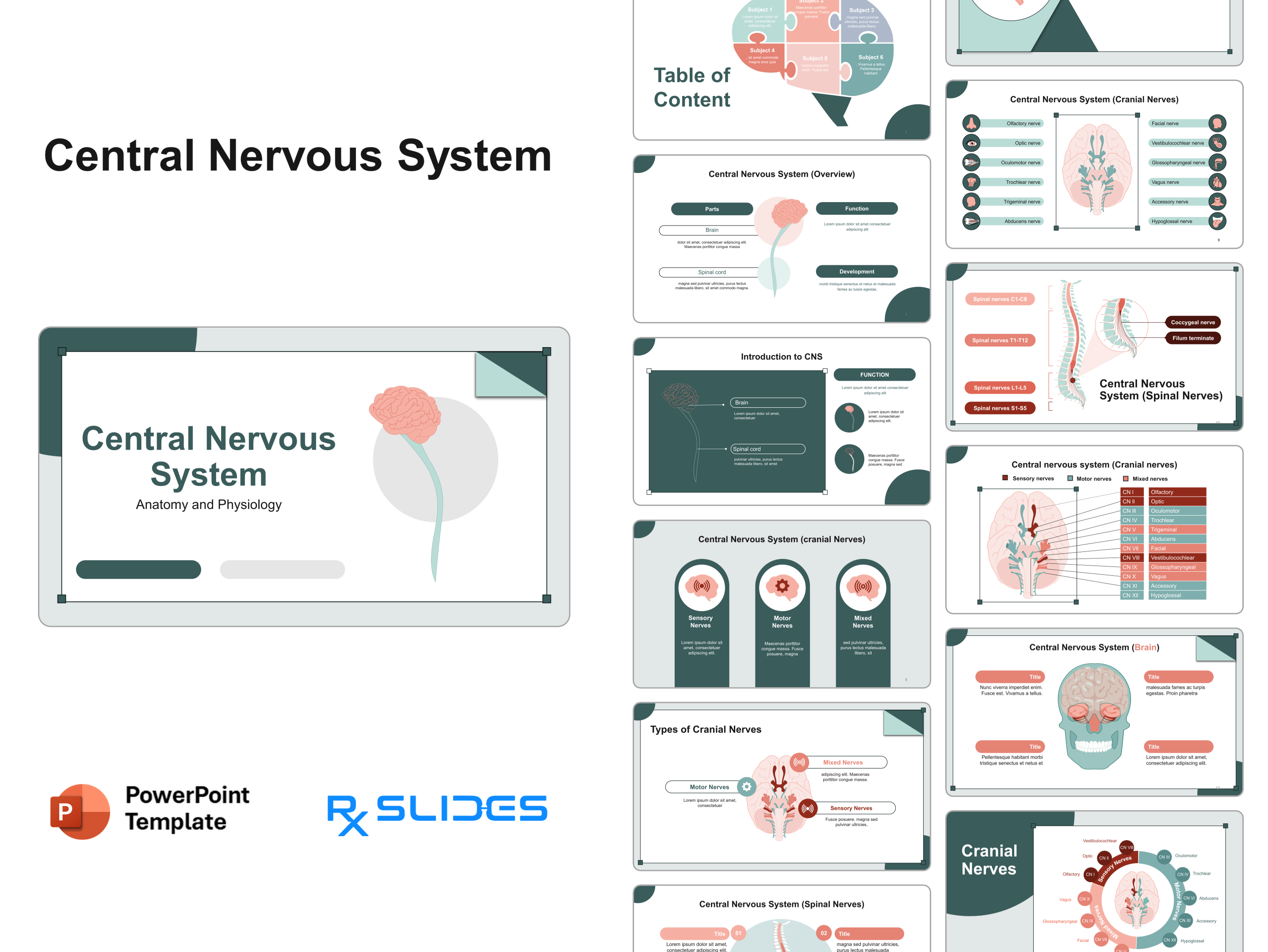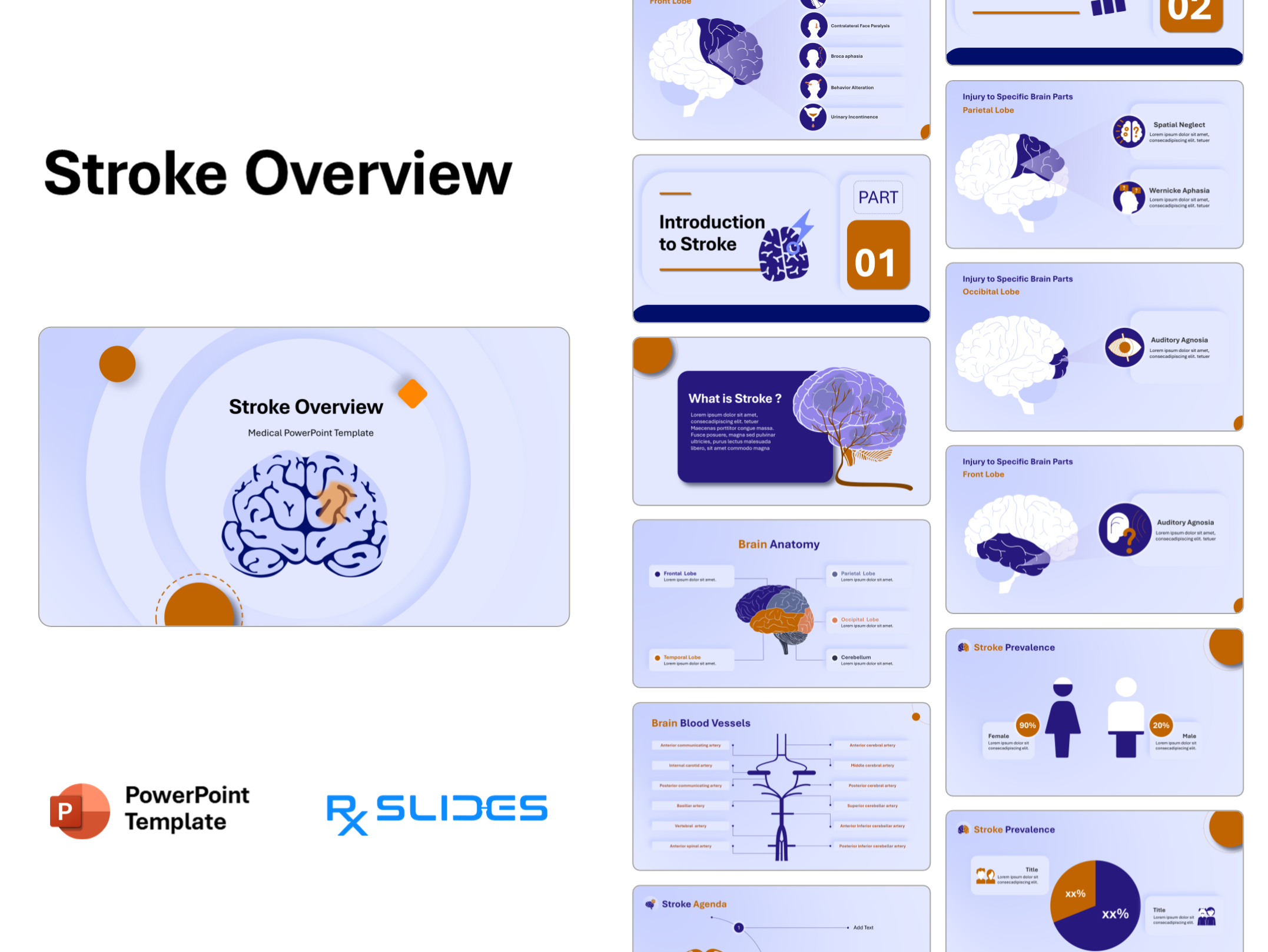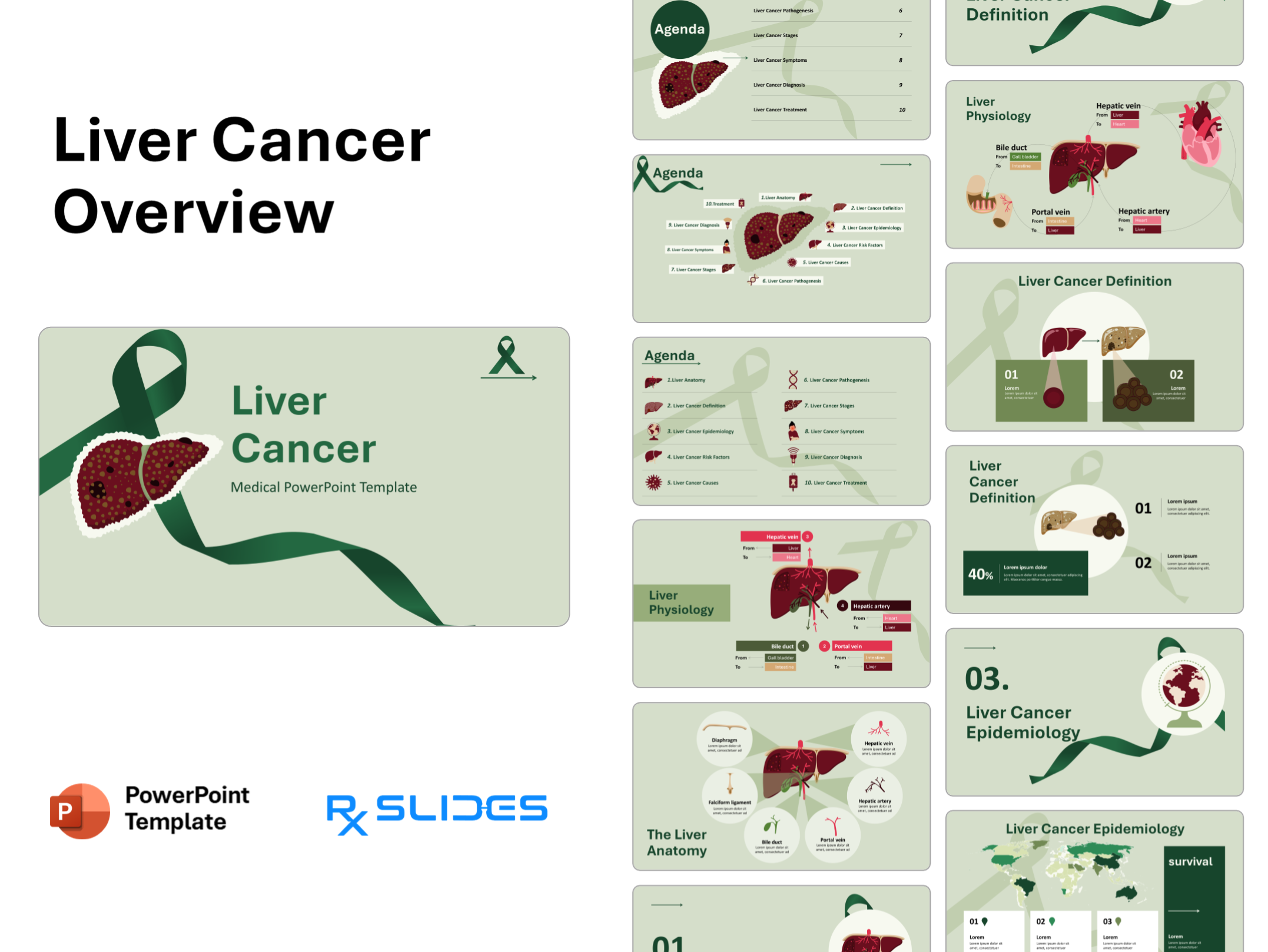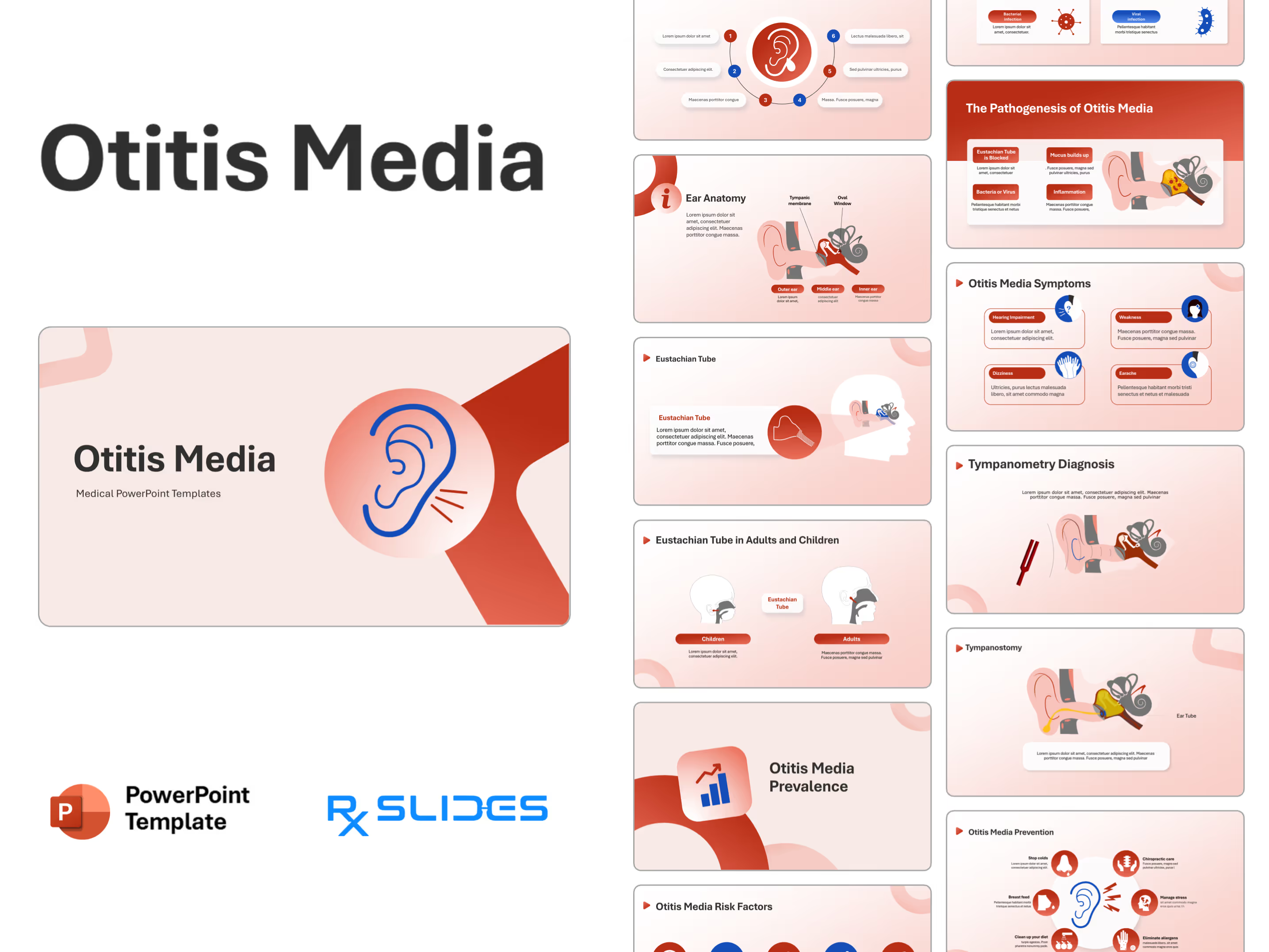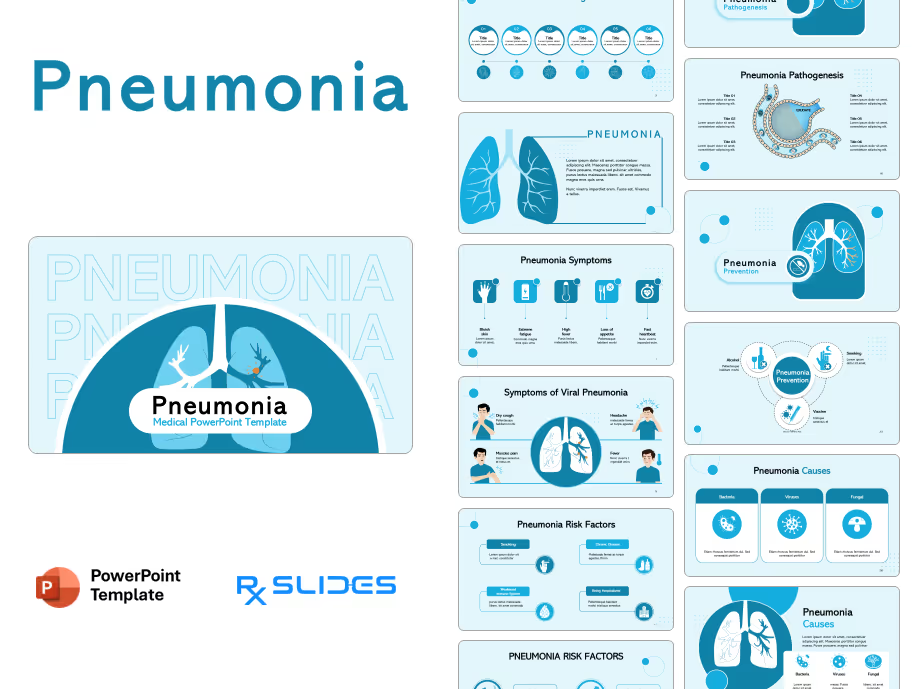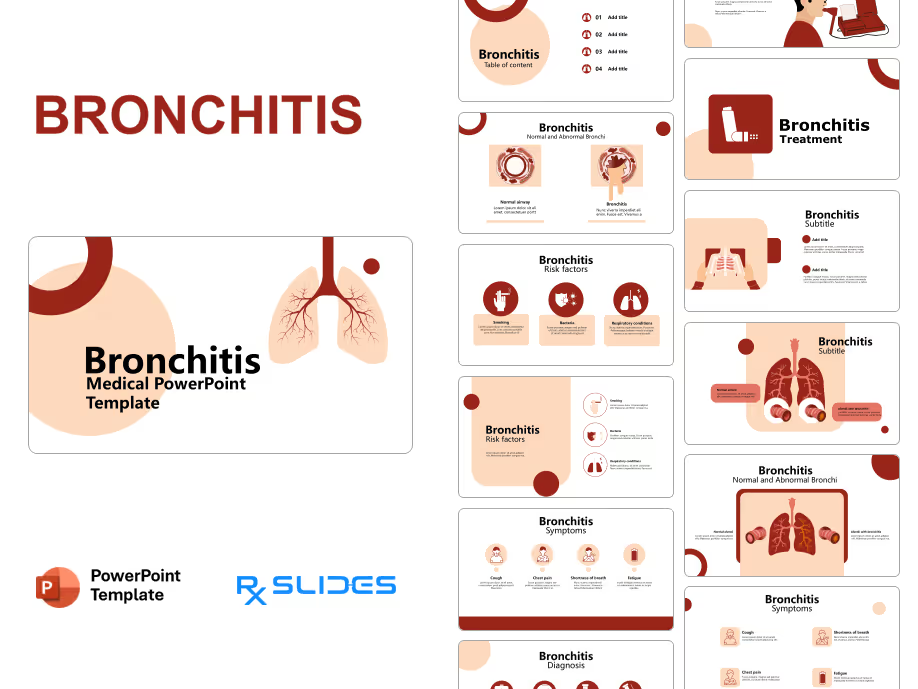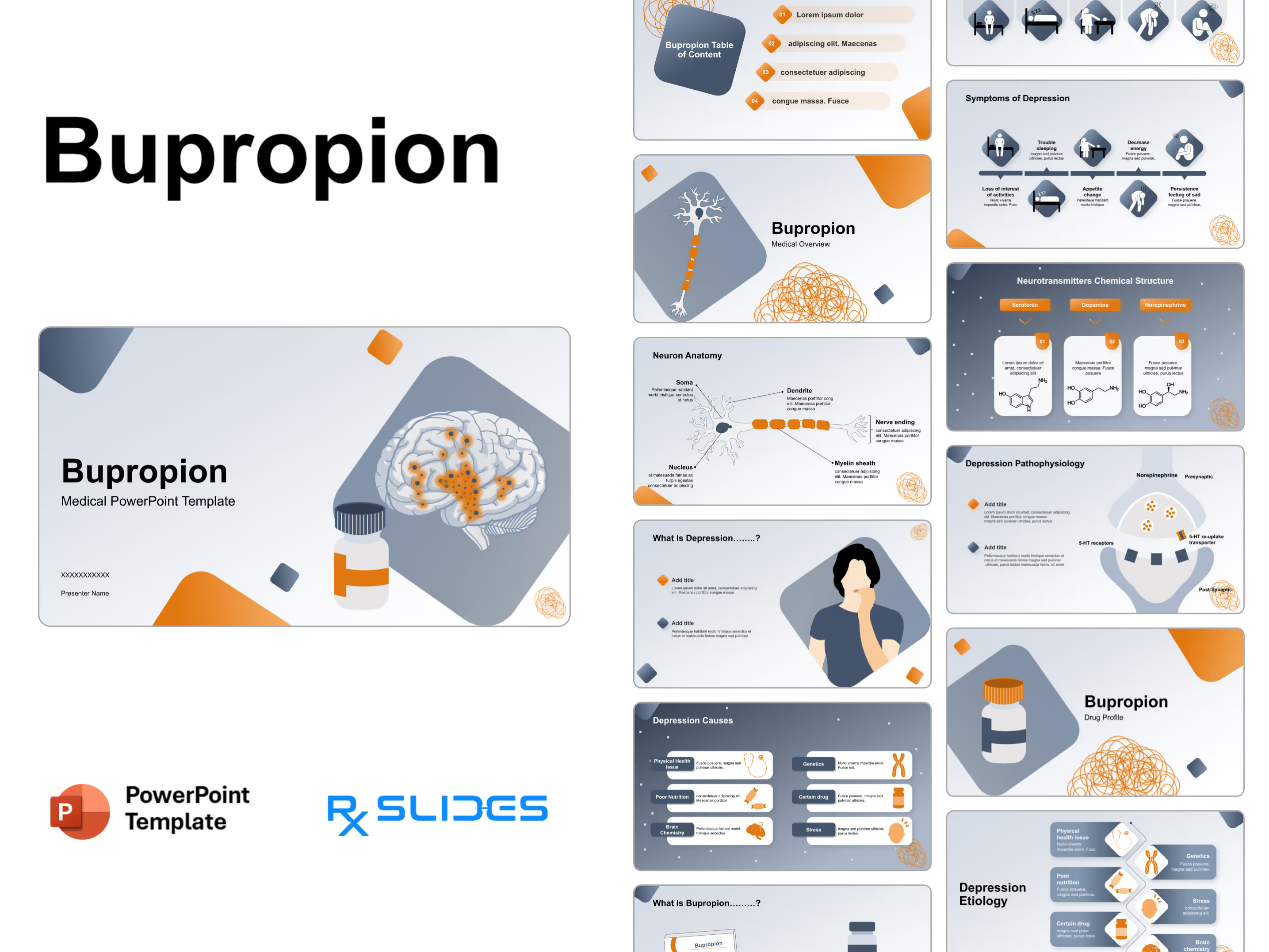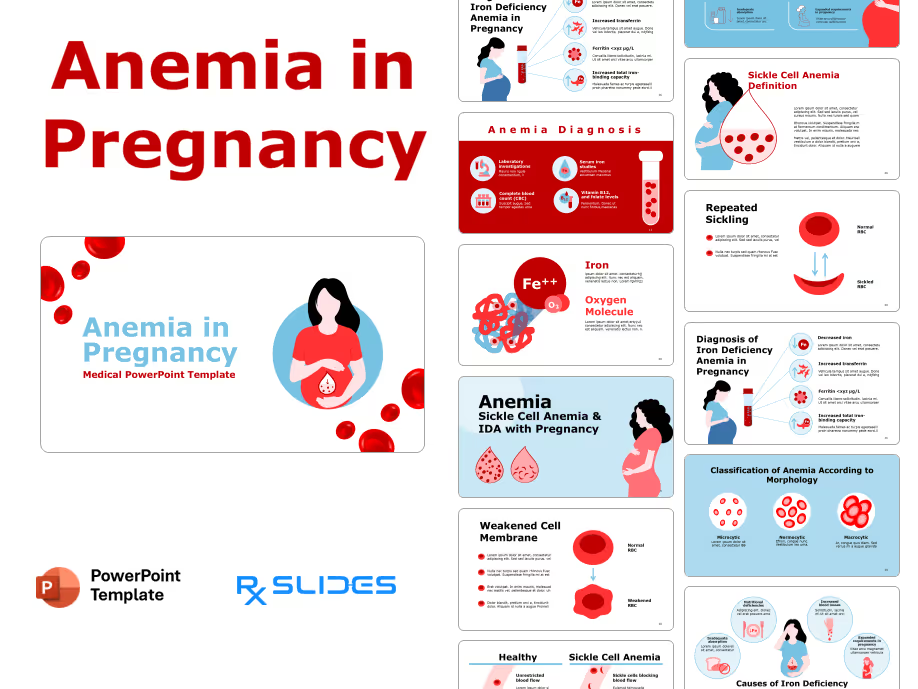Sleep Apnea PowerPoint Template
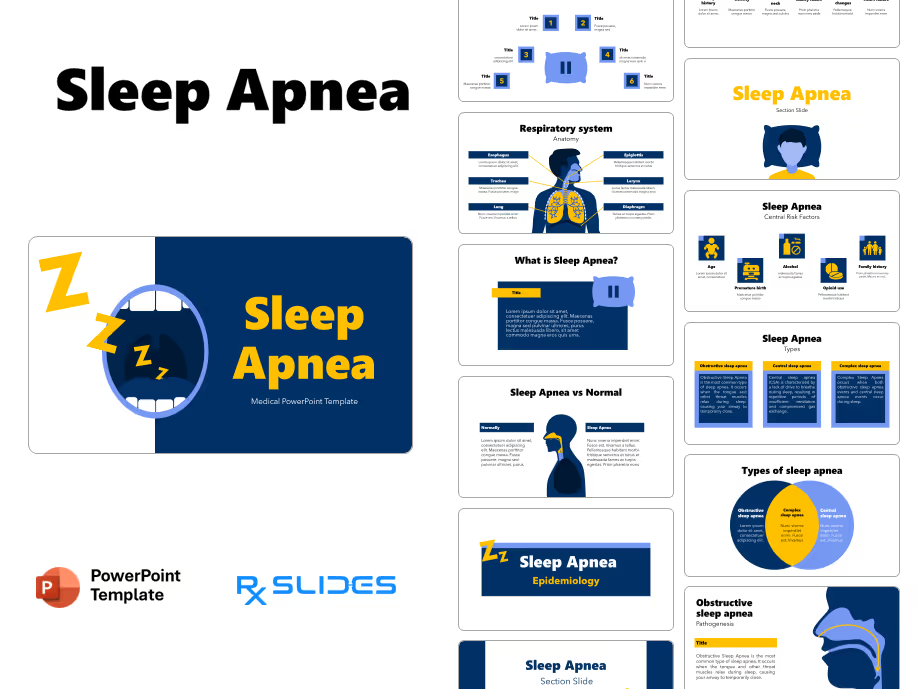
Sleep Apnea: Medical PowerPoint Template
- The Sleep Apnea PPT is a dynamic medical PowerPoint template designed to help you realize the full potential of your presentation.
- RxSlides template includes medical animations and infographics to attract your audience.
- From pleural effusion to pneumonia, RxSlides has the respiratory disease templates you need to educate and inform.
Sleep Apnea PowerPoint Template Content
Slide 1: Sleep Apnea Medical PowerPoint Template Cover Slide
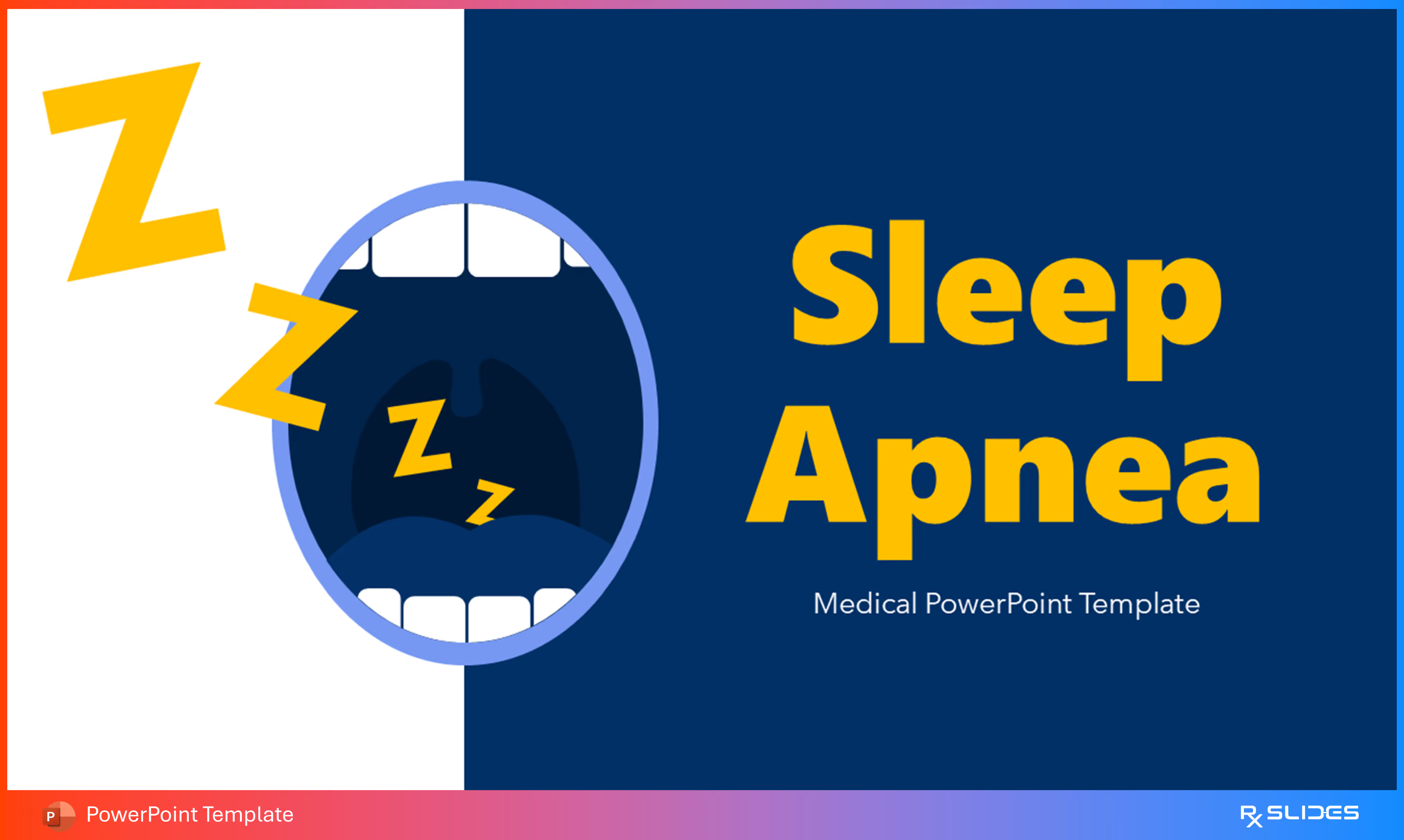
- The engaging title slide sets the professional tone for your entire presentation.
- Featuring a clean design.
- Ideal for academic lectures, clinical presentations, or pharmaceutical product launches, this slide ensures a strong opening for any presentation on this sleep disorder.
Slide 2: Sleeping Disorder Agenda Slide
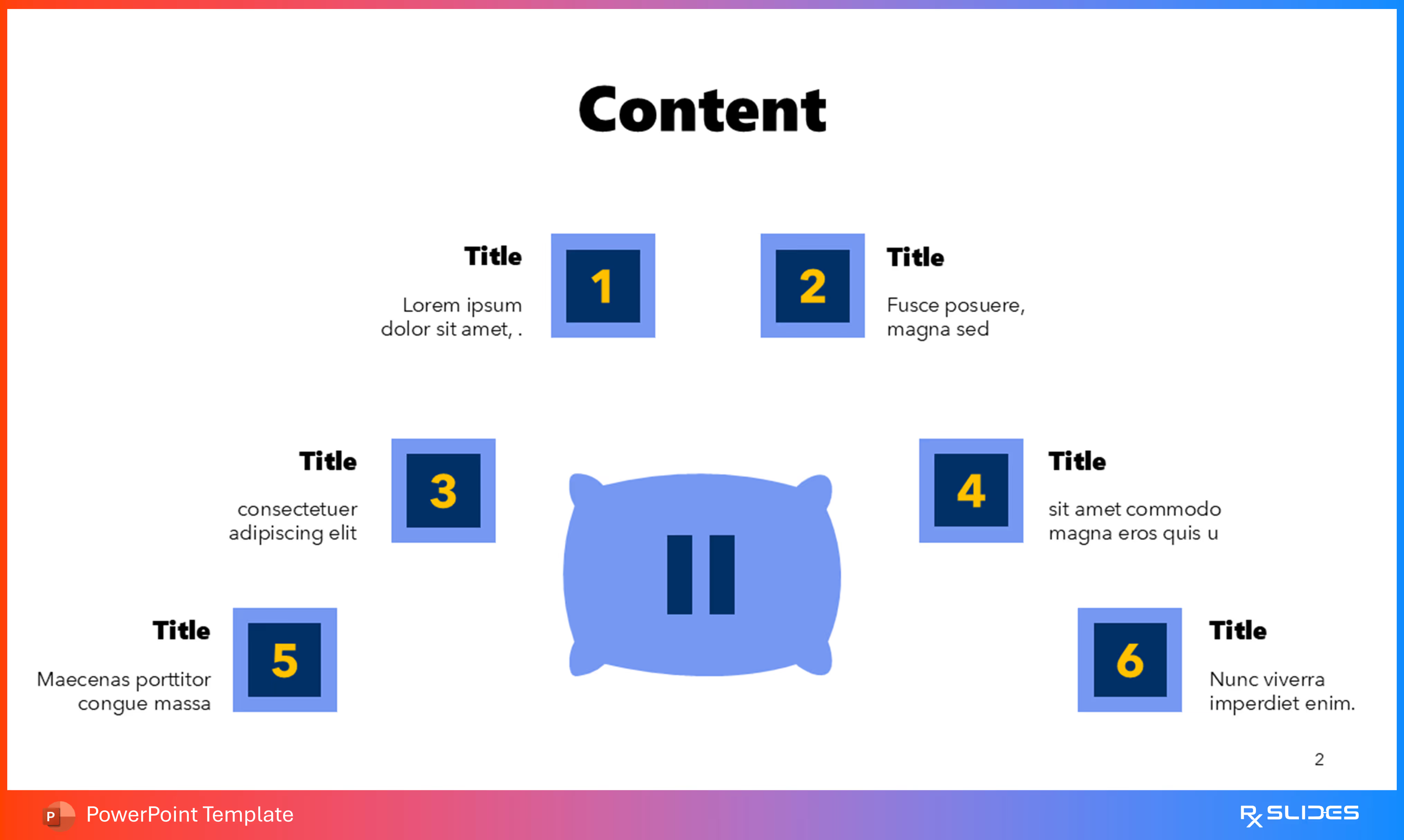
- This dynamic slide provides a clear roadmap for your audience, outlining the key sections of your medical presentation on the condition using related visuals to the disease.
- Its organized layout allows for easy navigation through complex topics, ensuring your audience stays engaged and informed.
- This slide is perfect for medical students preparing for exams or professionals structuring a comprehensive seminar.
Slide 3: Lung Anatomy Section Slide
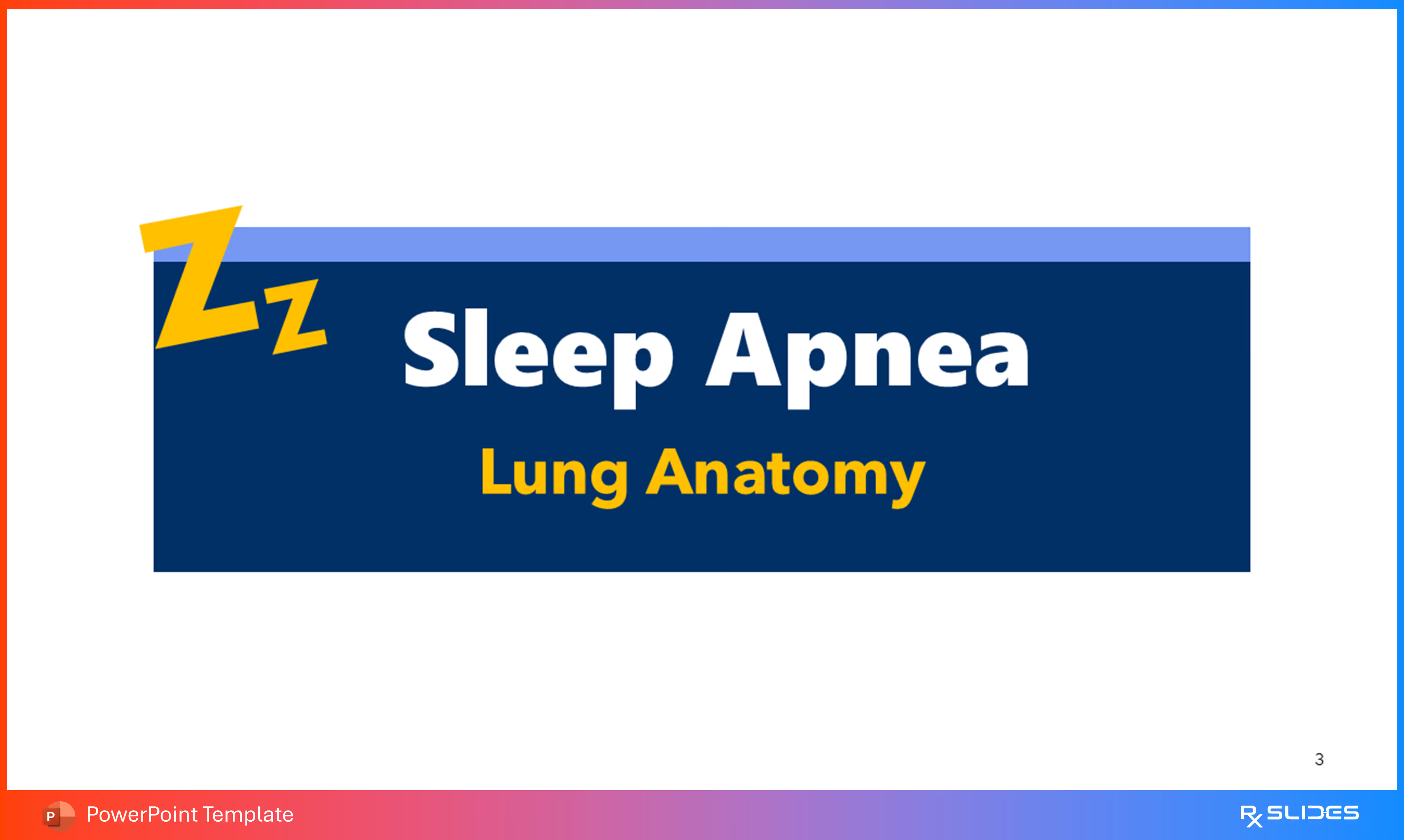
- Function as a key for the upcoming content.
- You can insert any other text and manage your presentation.
Slide 4: Lung Anatomy Animated Slide
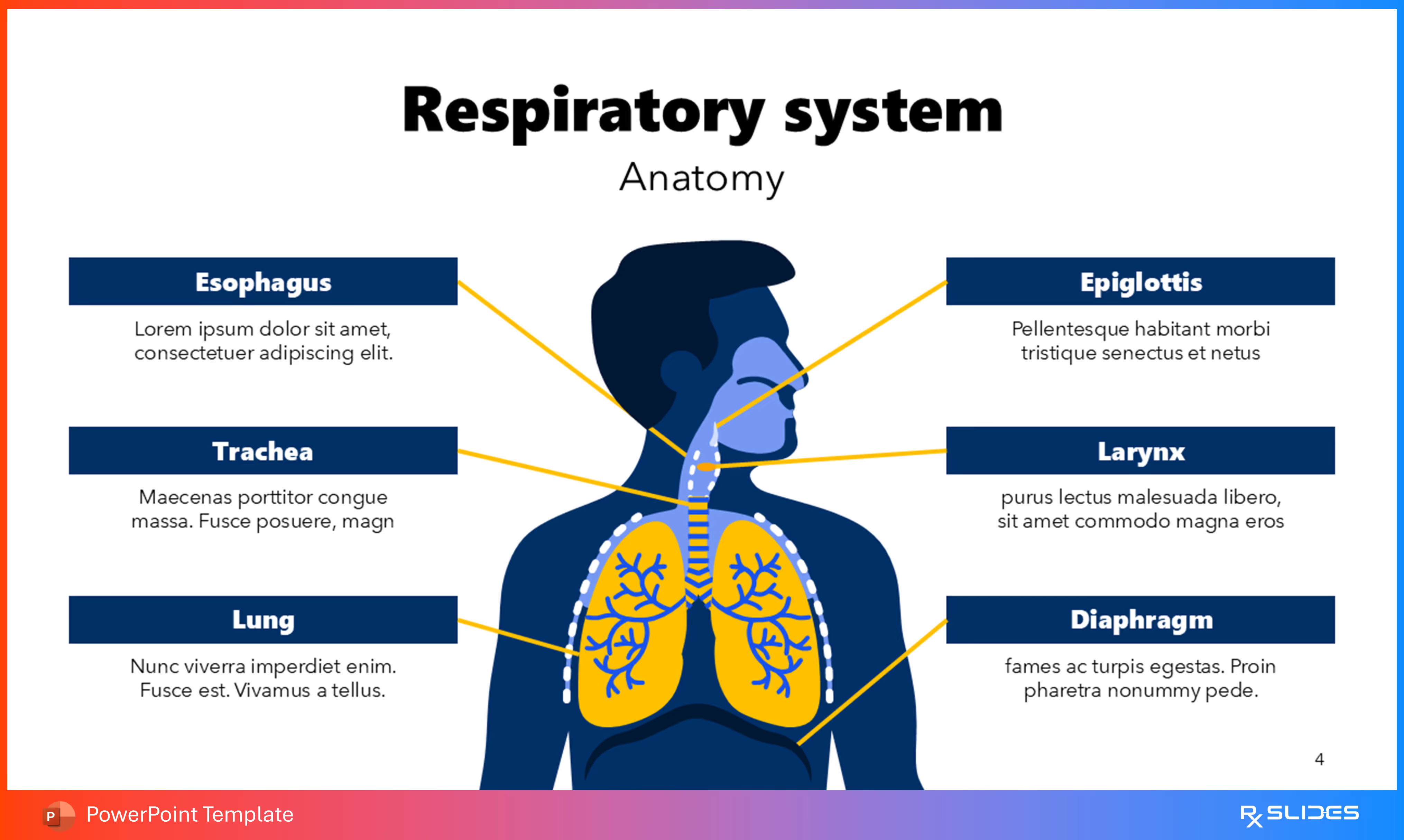
- Explore the detailed anatomy of the respiratory system, including the epiglottis, larynx, diaphragm, esophagus, trachea, and lungs; it provides a foundational understanding crucial for comprehending the disorder's mechanisms.
- Essential for medical students studying respiratory physiology and professionals explaining the anatomical basis of this health challenge
Slide 5: Definition Section Slide
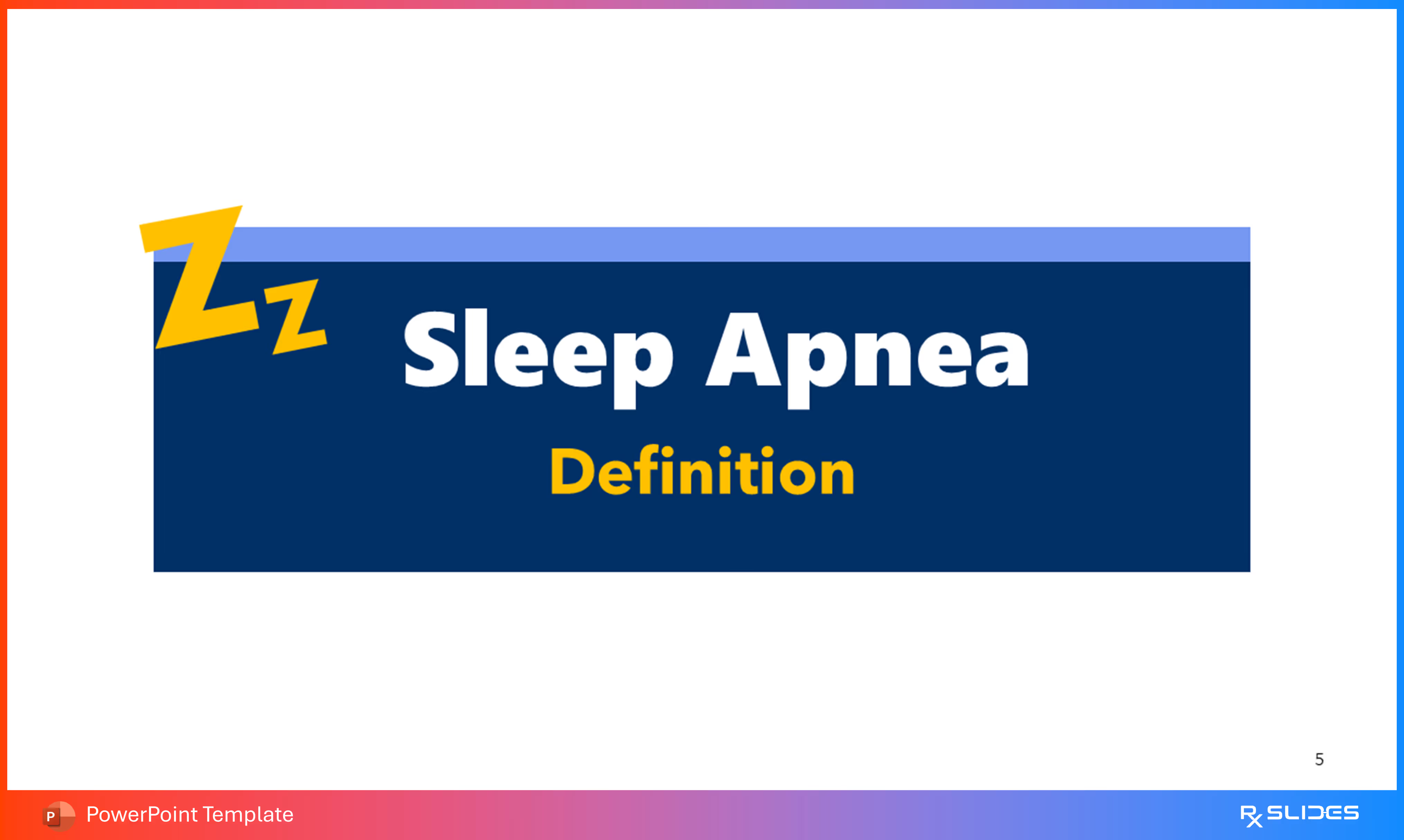
- This transition slide maintains flow and signals a new, important topic, helping your audience follow the structure of your educational content on the syndrome.
Slide 6: What is Sleep Apnea?
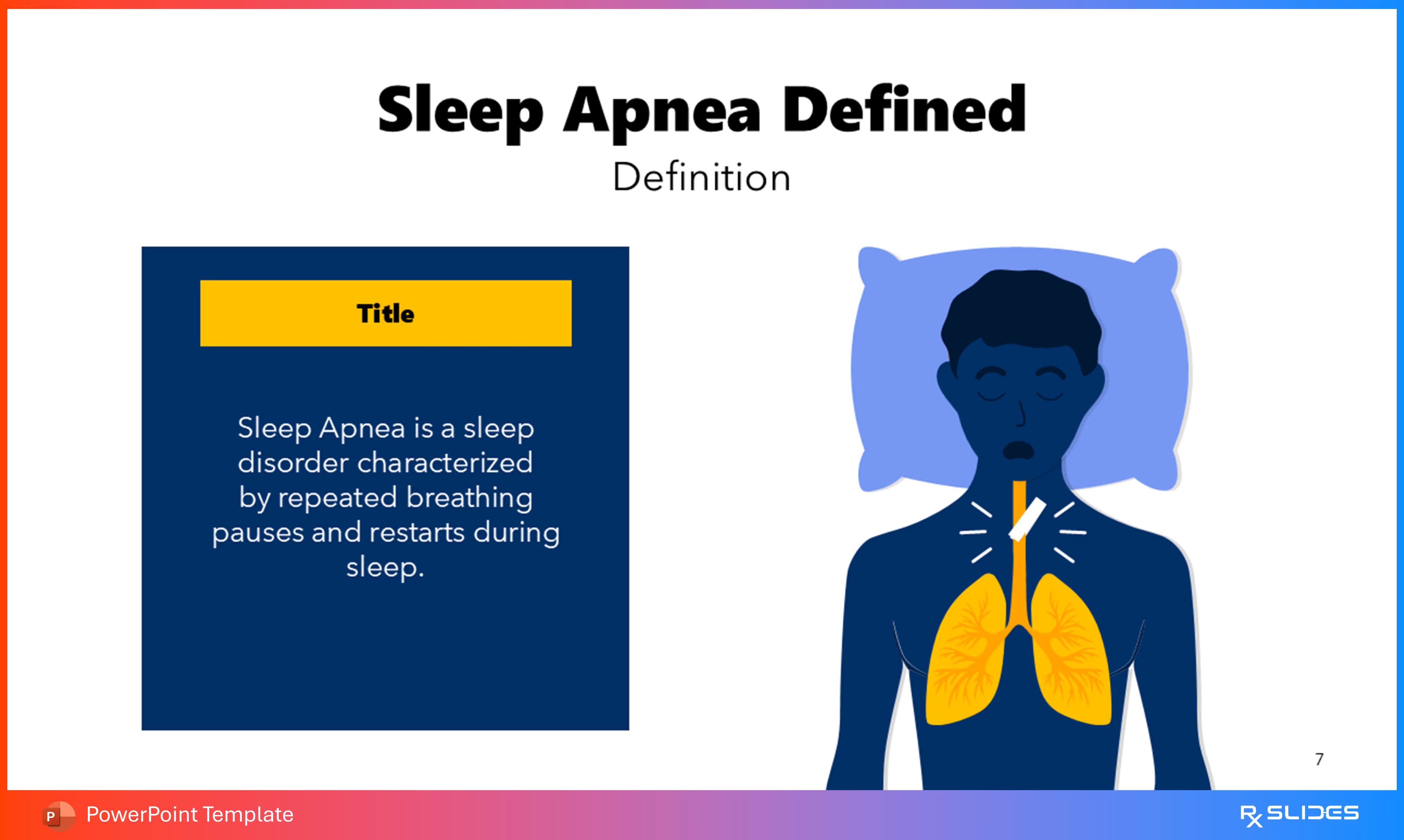
- This foundational slide provides a concise yet comprehensive definition of this prevalent sleep disorder.
- It's the perfect starting point for any overview presentation on the condition, ensuring all audience members, from students to experienced clinicians, are on the same page.
Slide 7: Definition of Sleep Apnea Defined

- Building on the previous slide, this slide offers more definition. Design the condition; make it another tool to use in your presentation.
Slide 8: Sleep Apnea vs. Normal
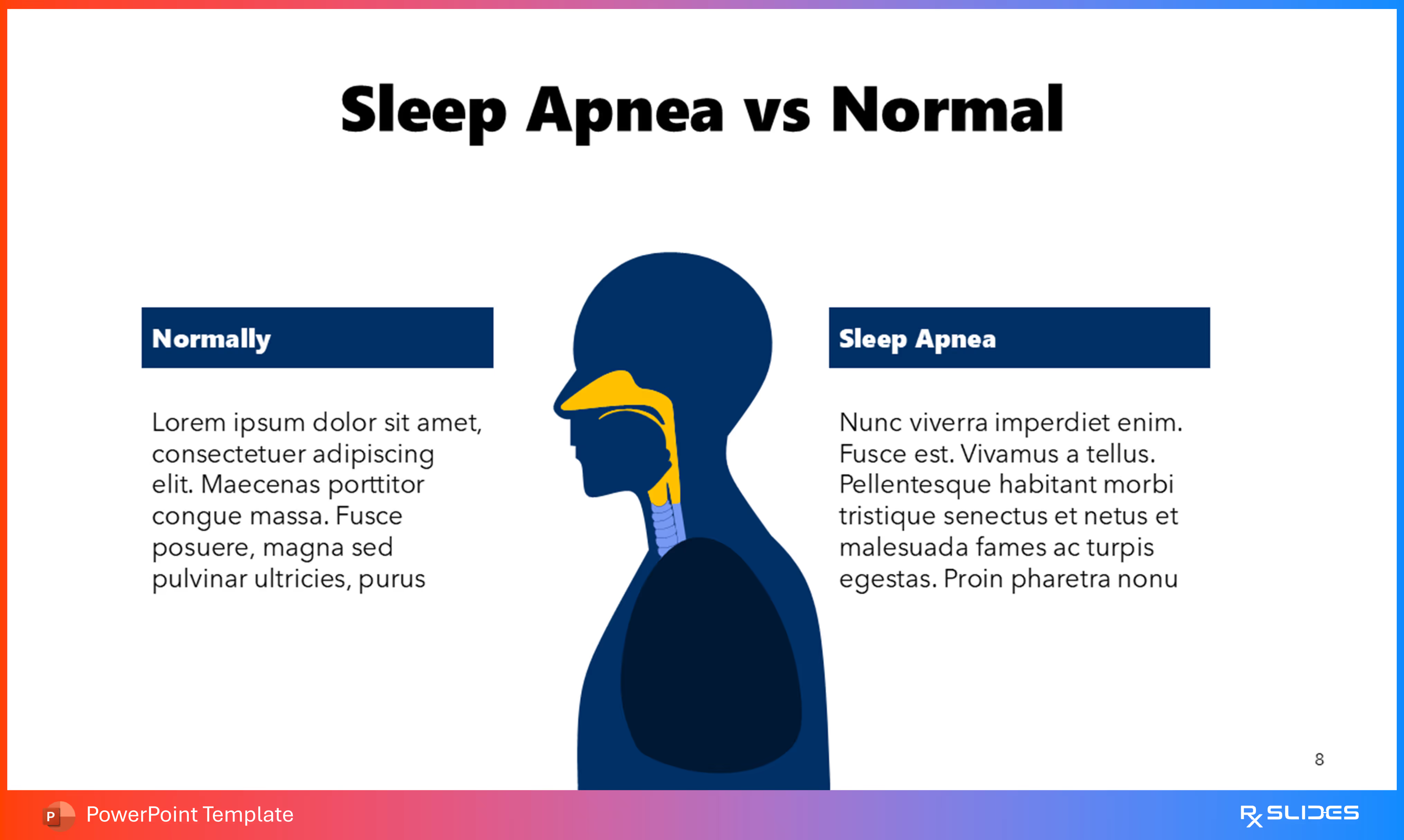
- Simple, clean design to visually compare and contrast normal breathing patterns with those experienced during the syndrome.
- Ideal for sleep disorder diagnostics training and illustrating the abnormal respiratory events in its pathophysiology.
Slide 9: Sleep Apnea Section Slide
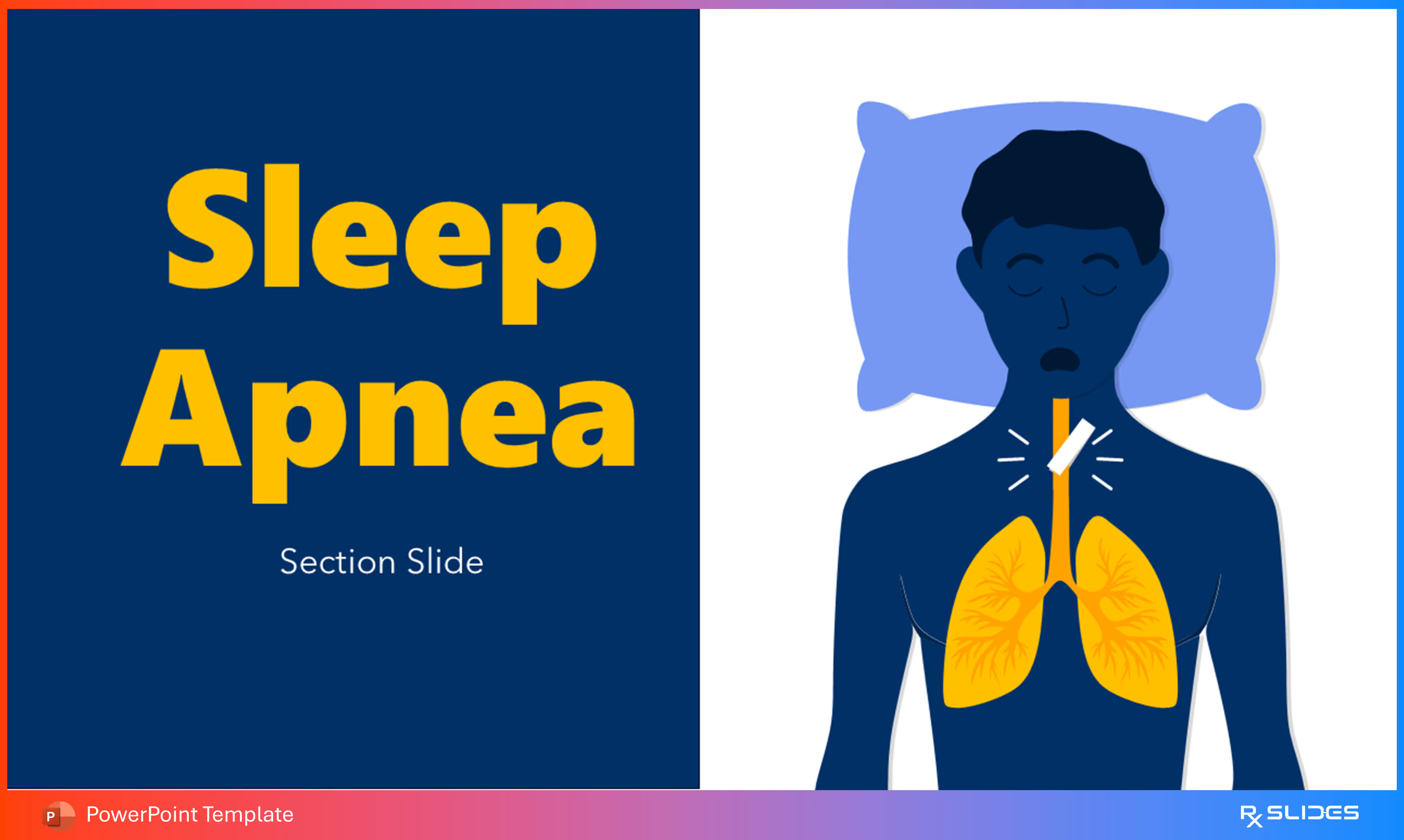
- A dedicated section slide for smooth transitions between major topics within your presentation on this condition. Insert your topic name and present in no time.
Slide 10: Sleep Apnea Epidemiology
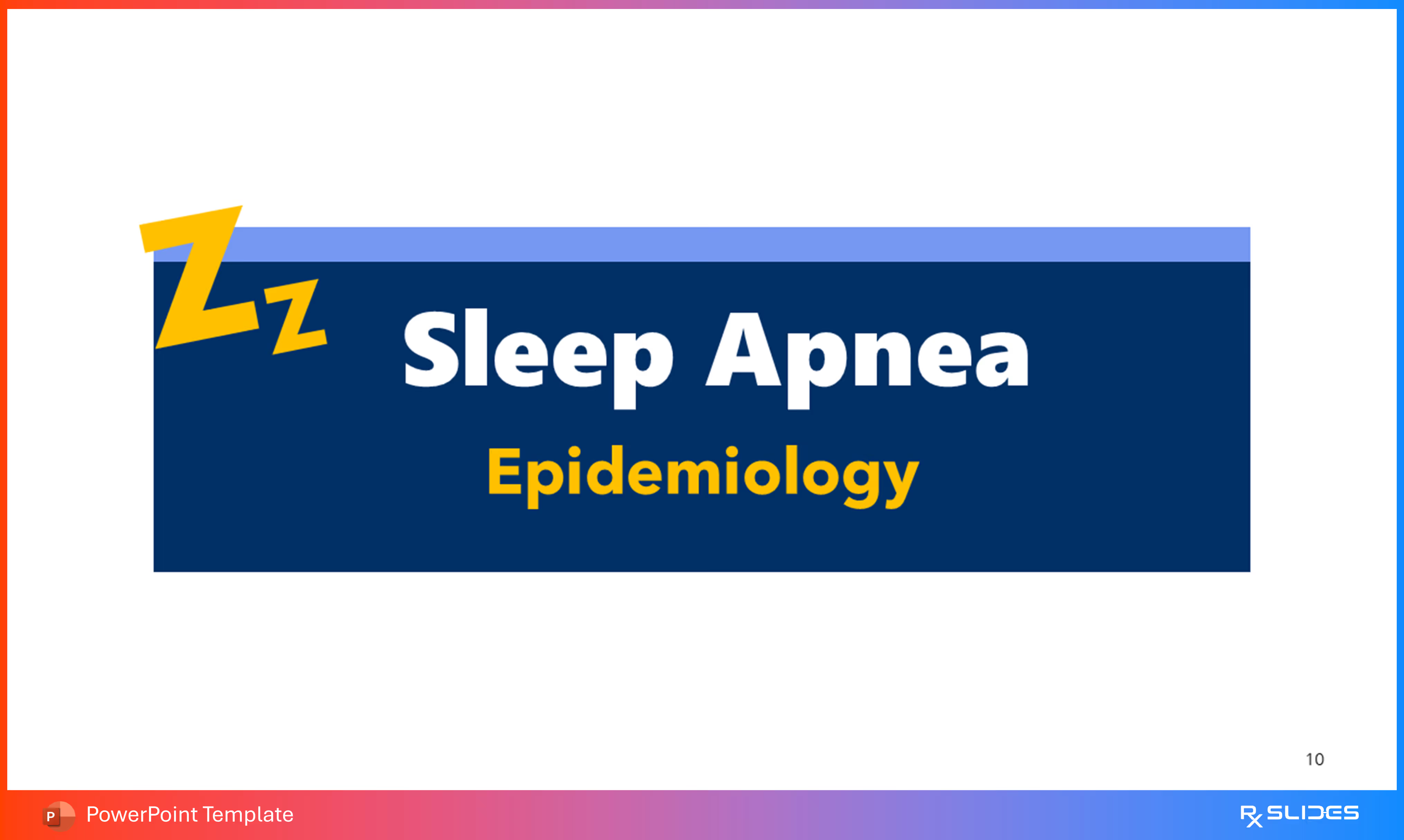
- This section slide introduces the epidemiology segment of your presentation, focusing on the prevalence and distribution of this sleep disorder.
- It prepares your audience for the statistical data and demographic insights to follow, vital for understanding the global impact of the condition.
Slide 11: Epidemiology Gender Prevalence
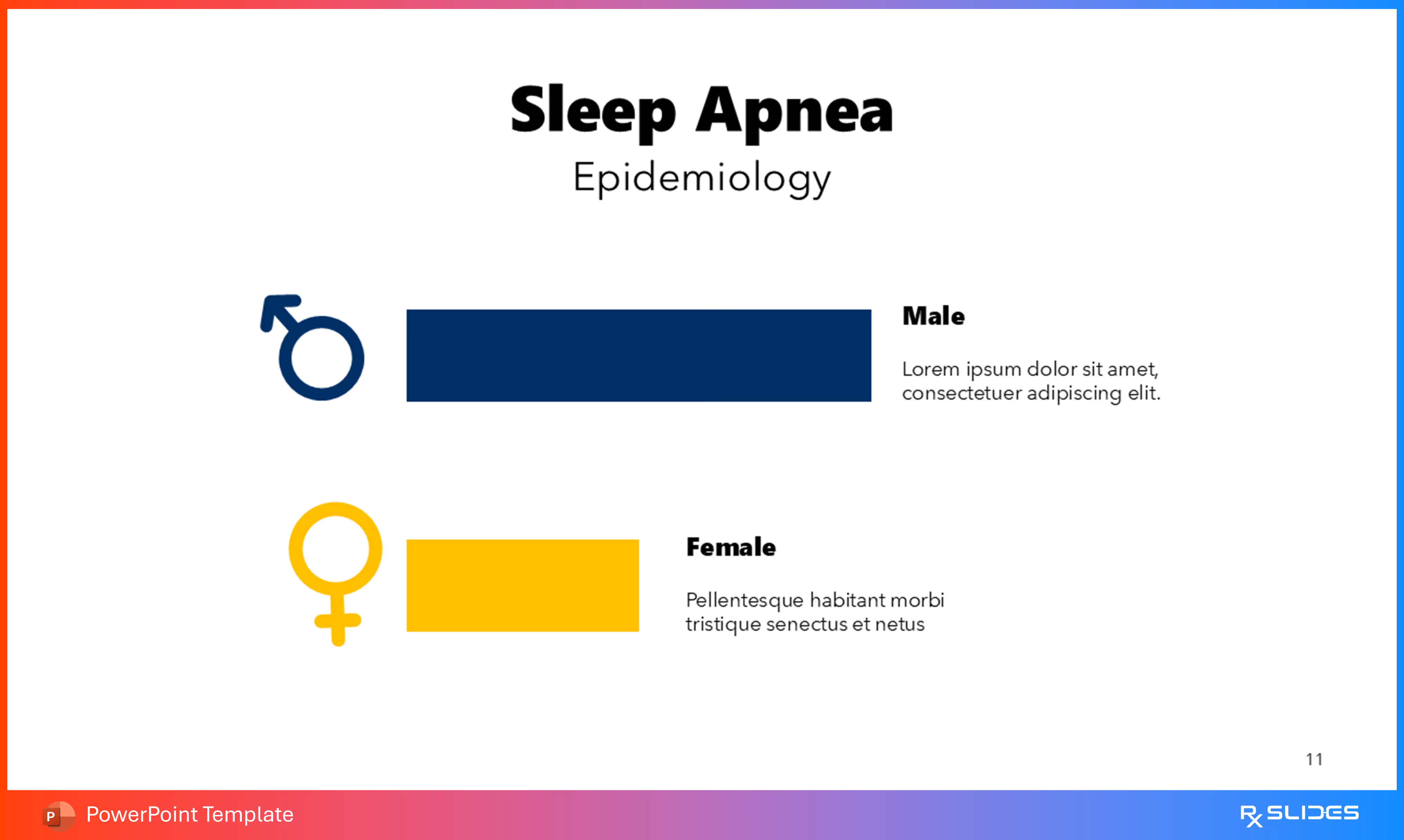
- Present key epidemiological data on the condition, specifically highlighting the prevalence differences between male and female populations.
- This "Epidemiology" slide is essential for discussing demographic risk factors and understanding the prevalence of the syndrome across different groups.
- Perfect for public health discussions or clinical research summaries.
Slide 12: Sleep Apnea Section Slide
.avif)
- Another animated storytelling section slide, ready to be used for seamless transitions.
- This creative slide ensures your medical presentation on the disorder remains well-structured and easy to follow, allowing you to segment your content effectively.
Slide 13: Animated Epidemiology Slide
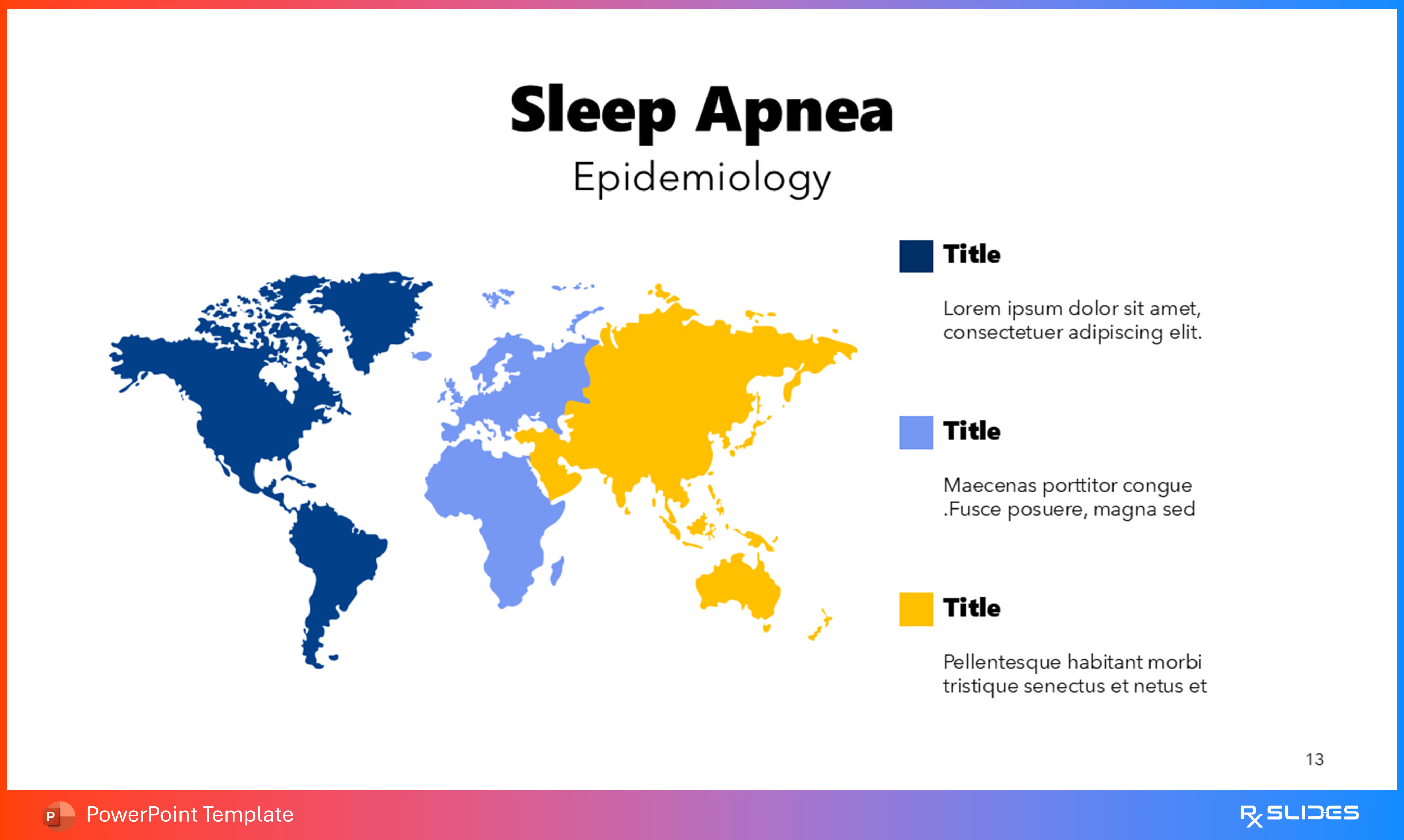
- This epidemiology slide allows for the presentation of crucial statistical data points related to any disease disorder.
- With placeholder titles, you can easily insert specific figures, prevalence rates, or incidence data, making it ideal for research presentations on the topic or market analysis for pharmaceutical companies.
Slide 14: Sleep Apnea Risk Factors
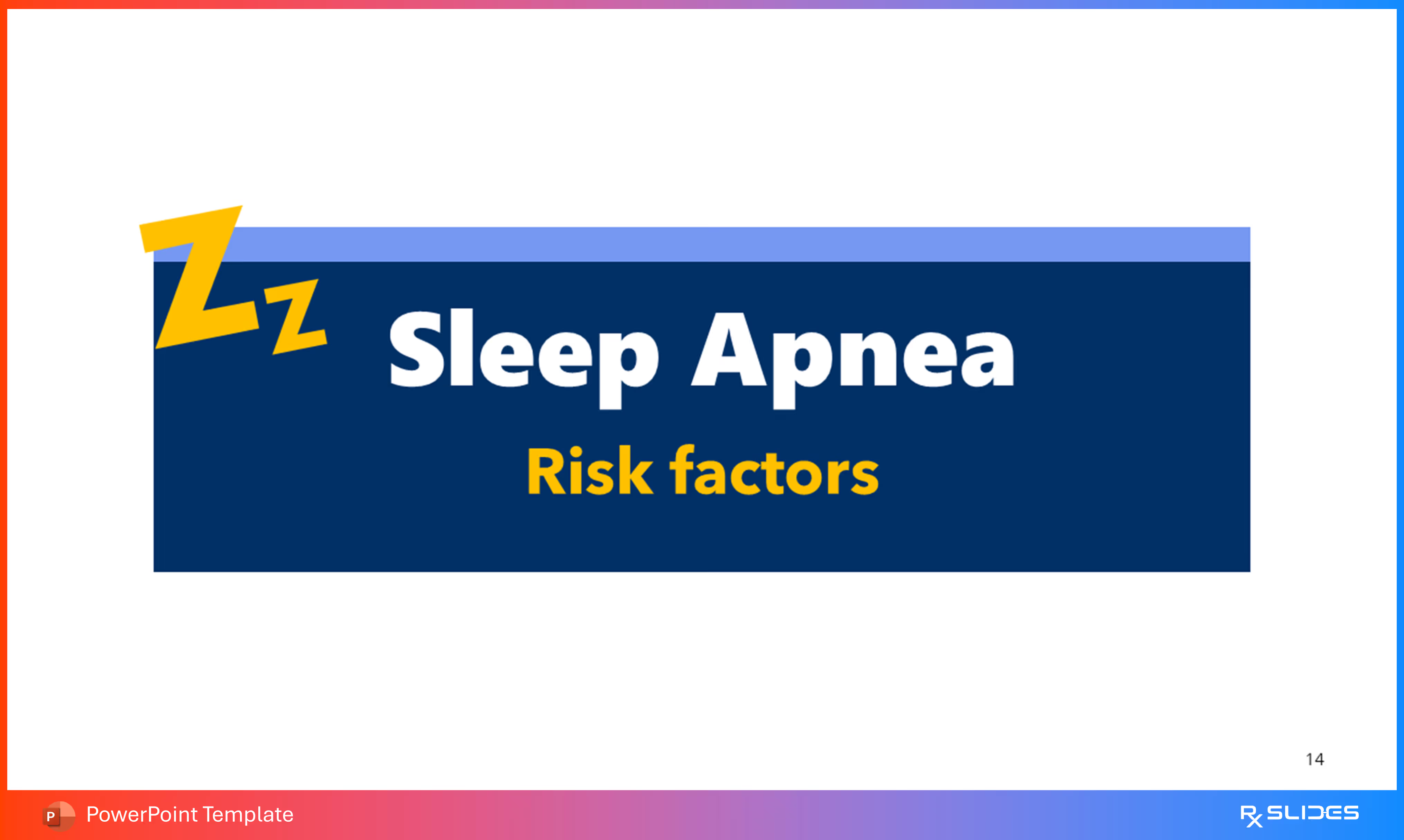
- This slide sets the stage for discussing the various elements that contribute to the development of the disorder.
Slide 15: Obstructive Risk Factors for Sleeping Disorder

- Detail the specific risk factors for obstructive sleep apnea (OSA).
- This slide covers elements like family history, obesity, neck circumference, kidney failure, hormonal changes, and heart failure.
Slide 16: Another Option for Sleep Apnea Section Slide
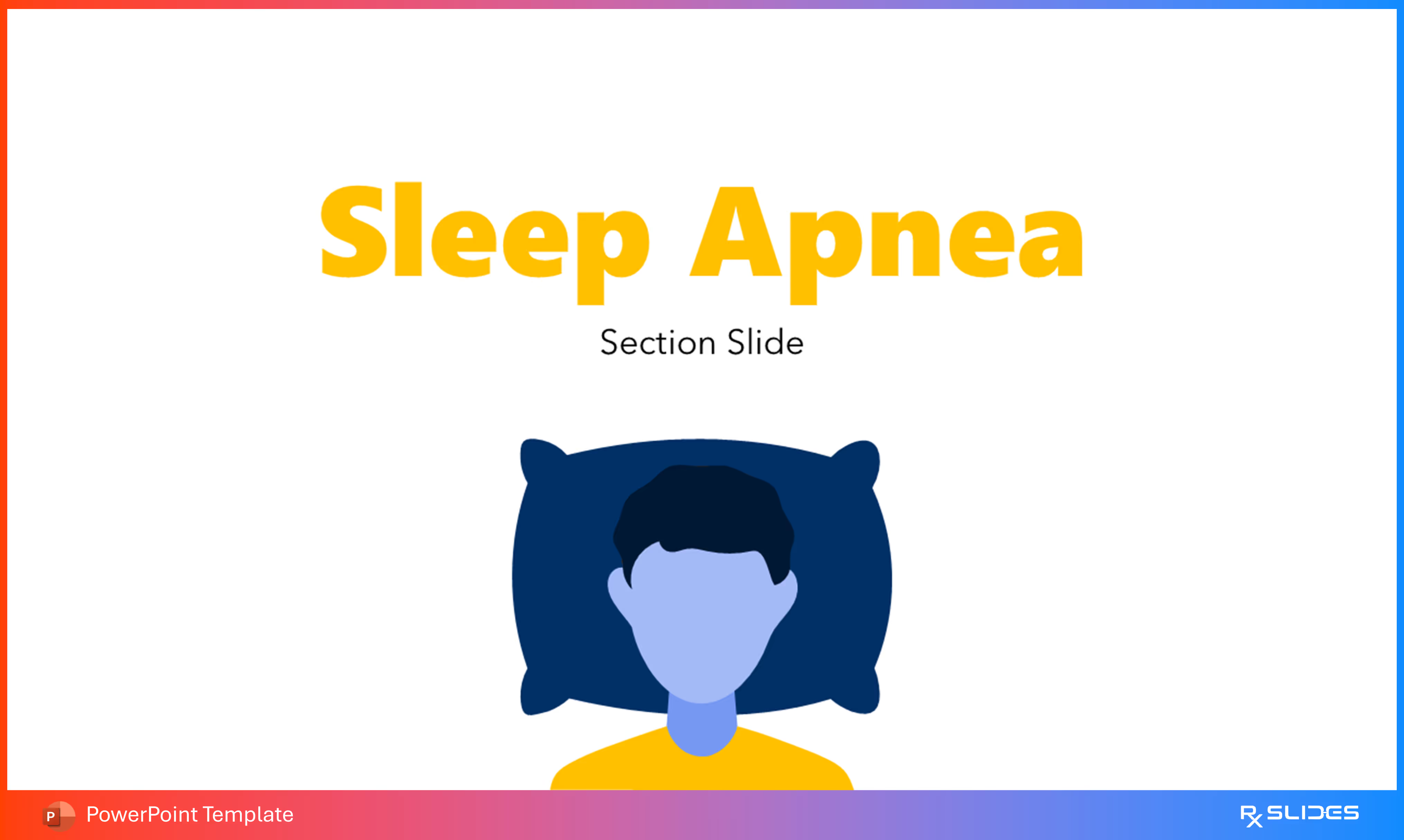
- This is another customizable section slide that helps you maintain a smooth flow through your medical presentations on the condition.
- Utilize this to introduce new categories or any other major content shift.
Slide 17: Central Risk Factors of Sleep Apnea
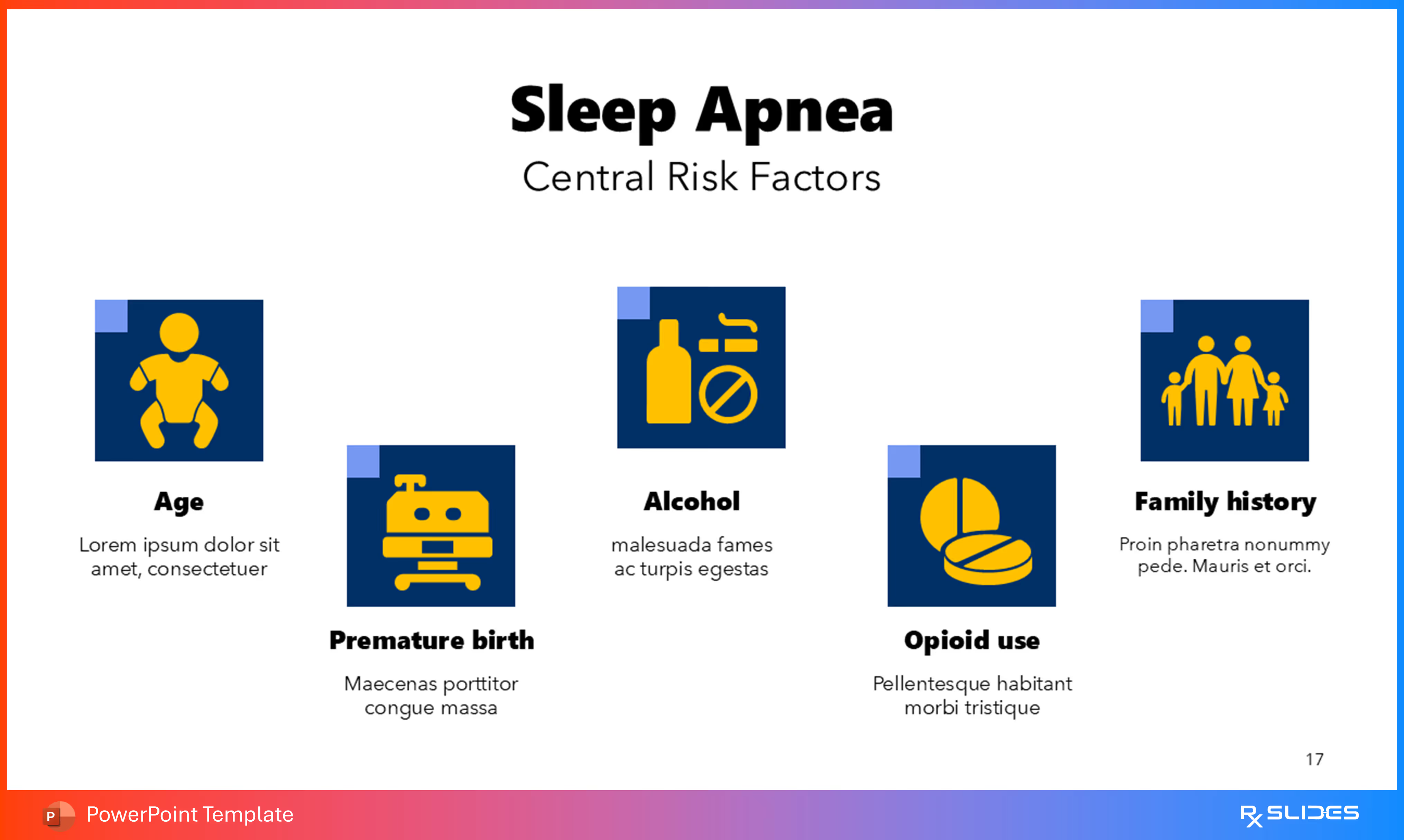
- This slide addresses elements such as age, premature birth, alcohol consumption, family history, and opioid use, providing critical insights into the non-obstructive causes of the syndrome.
- Essential for CSA pathophysiology discussions and differential diagnosis of sleep-related breathing issues.
Slide 18: Sleep Apnea Types Section Slide
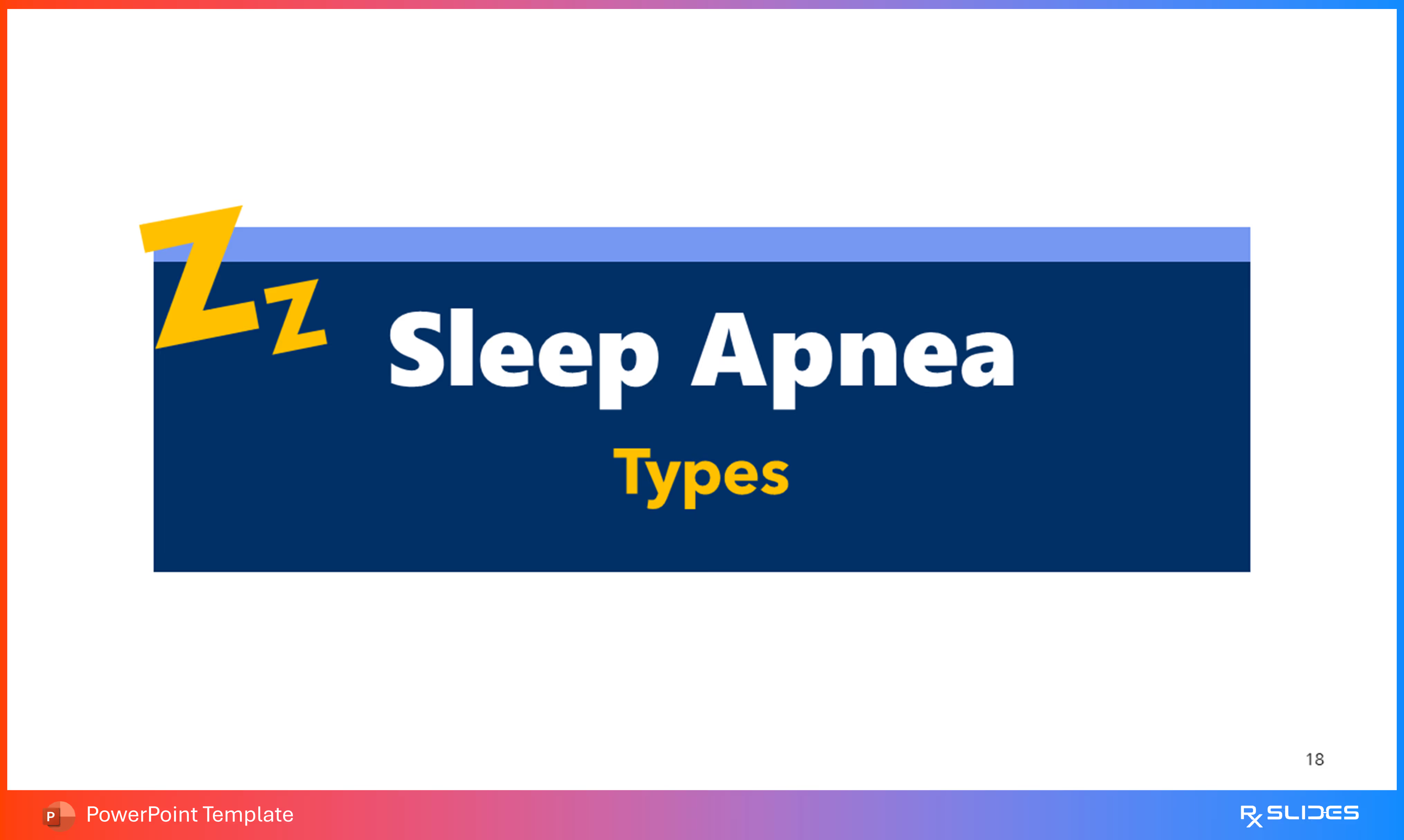
Slide 19: Table Animated Design for Types of Sleep Apnea
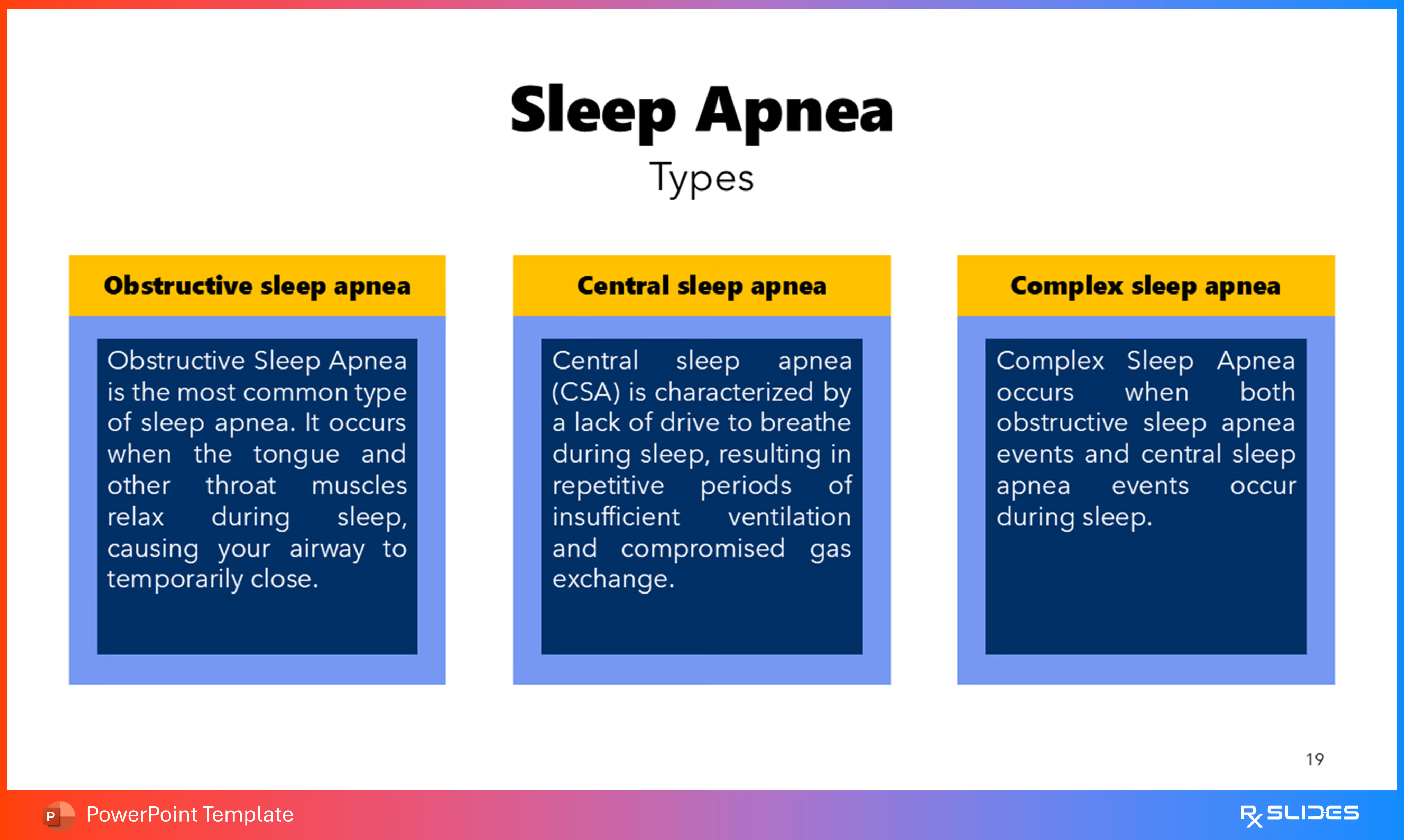
- Provide a concise overview of the three main types: Obstructive Sleep Apnea (OSA), Central Sleep Apnea (CSA), and Complex Sleep Apnea.
- Insert definitions for each, making it easy to differentiate between them.
- Perfect for sleep medicine lectures and patient understanding of these classifications.
Slide 20: Types of Sleep Apnea: Comparative Visual
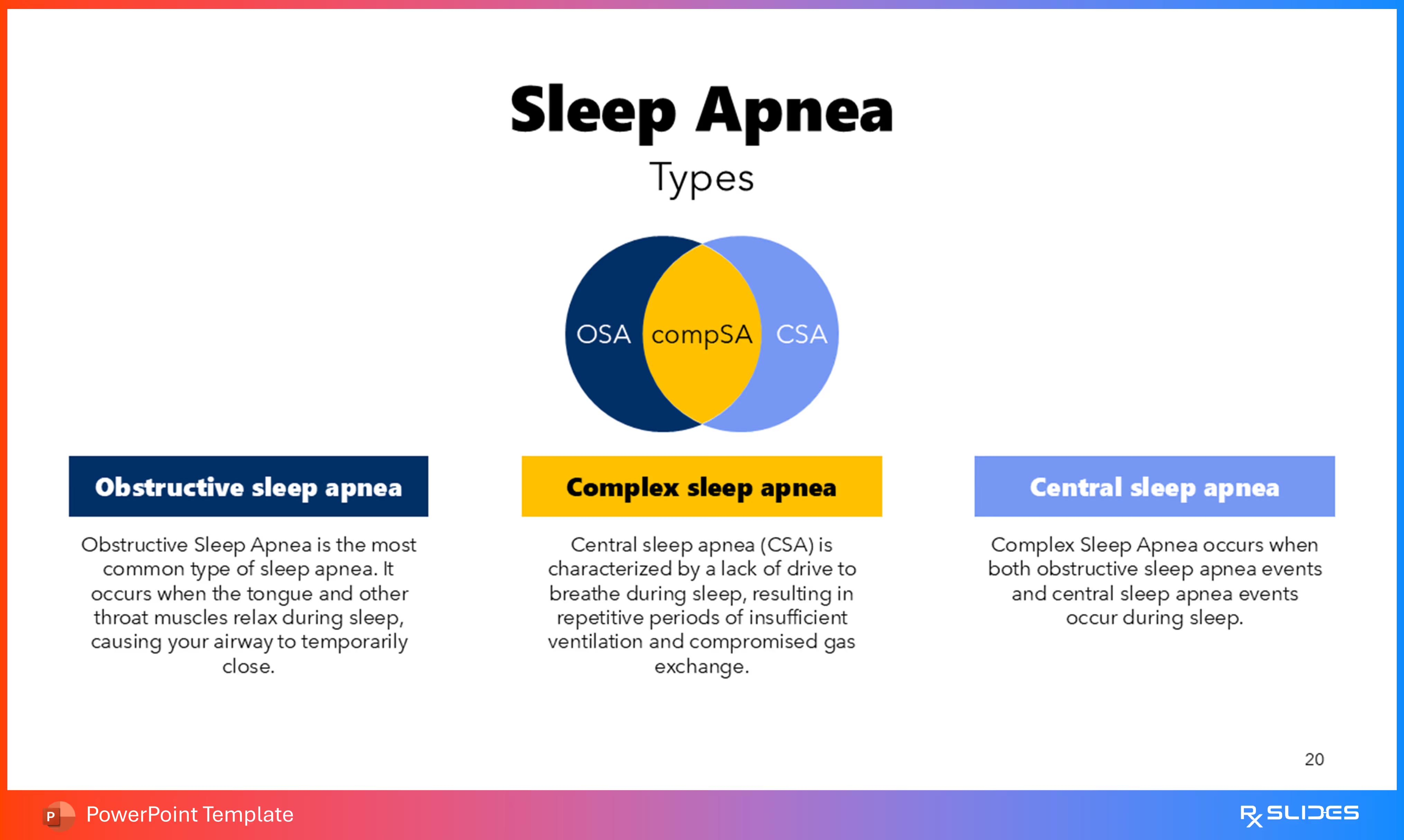
- Visually compare OSA, CSA, and CompSA (complex sleep apnea) using a clear graphic layout.
- This slide reinforces the distinctions between the types of the condition, alongside their definitions, aiding in visual learning and retention.
- Excellent for medical student revision and clinical differentiation of these breathing disorders.
Slide 21: Types of Sleep Apnea: Key Characteristics
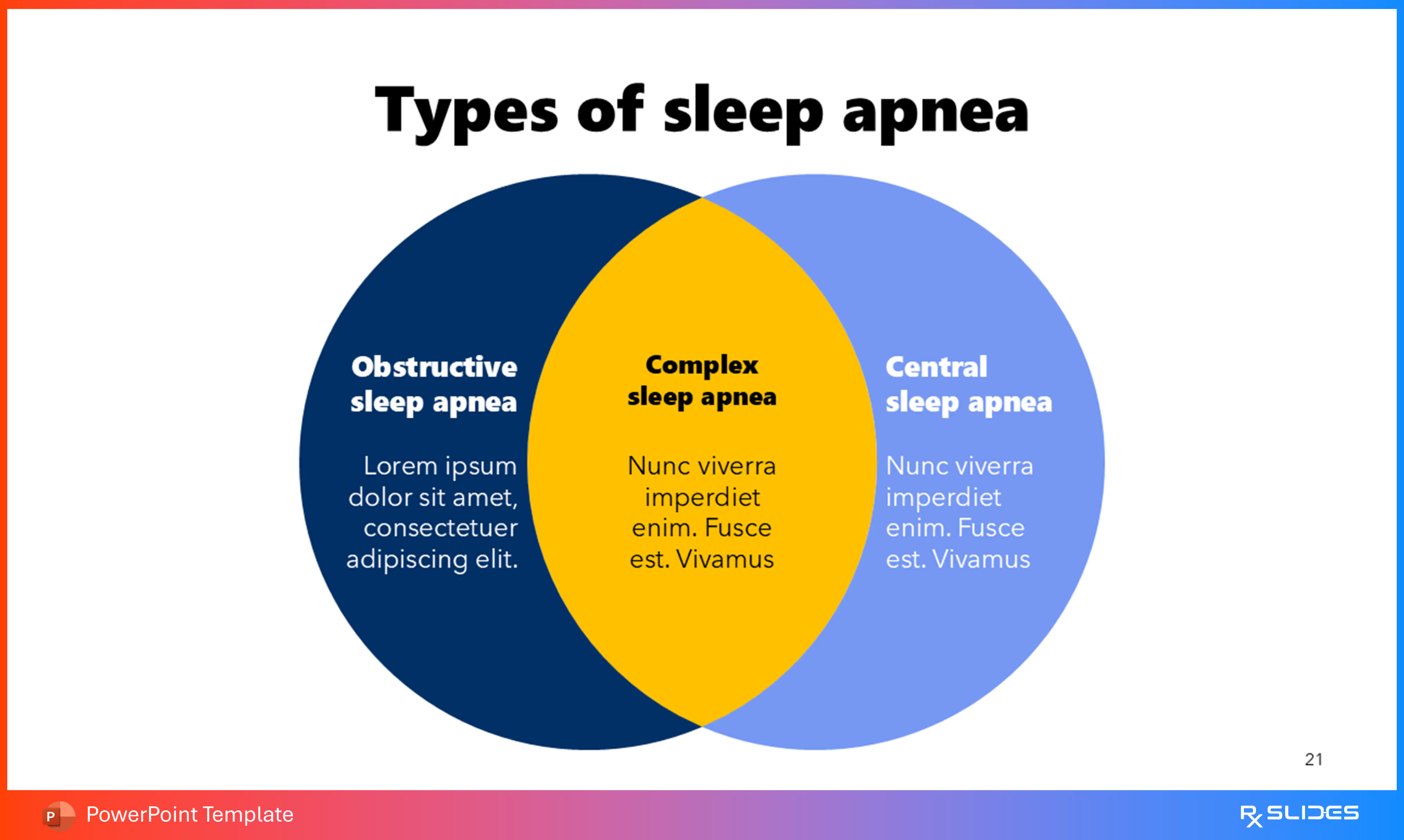
- This slide provides dedicated sections to outline the key characteristics of obstructive, central, and complex sleep apnea.
- It allows for a more detailed, just-insert-the-medical-information point-by-point comparison, deepening the understanding of each type.
- Ideal for in-depth sleep disorder pathology discussions.
Slide 22: Obstructive Sleep Apnea Pathogenesis: Animated Medical Template
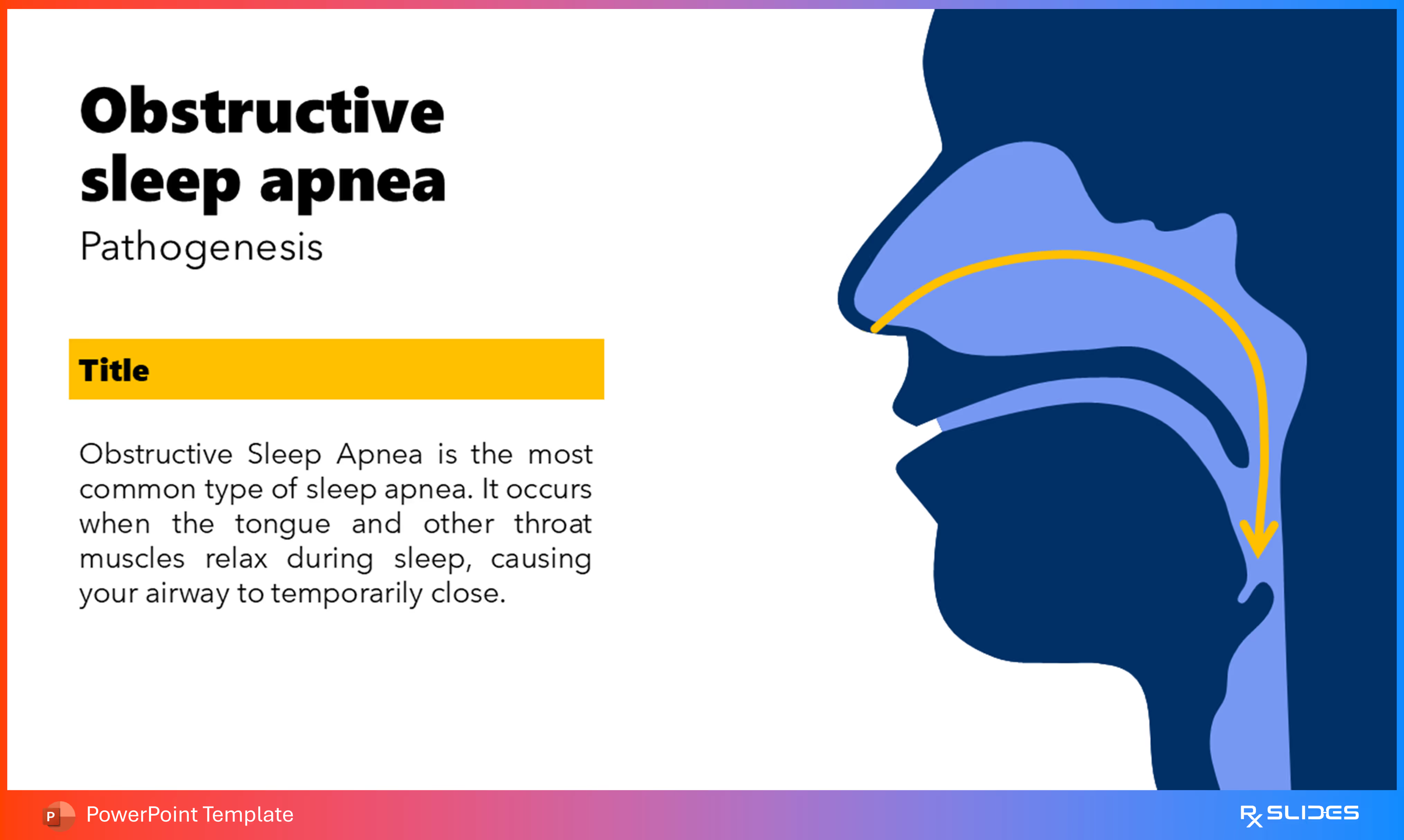
- This slide explains how the relaxation of the tongue and throat muscles leads to airway closure, providing crucial physiological insights.
- Essential for OSA pathophysiology education and illustrating the mechanical obstruction in breathing episodes.
Slide 23: Central Sleep Apnea Pathogenesis: Animated Medical Template
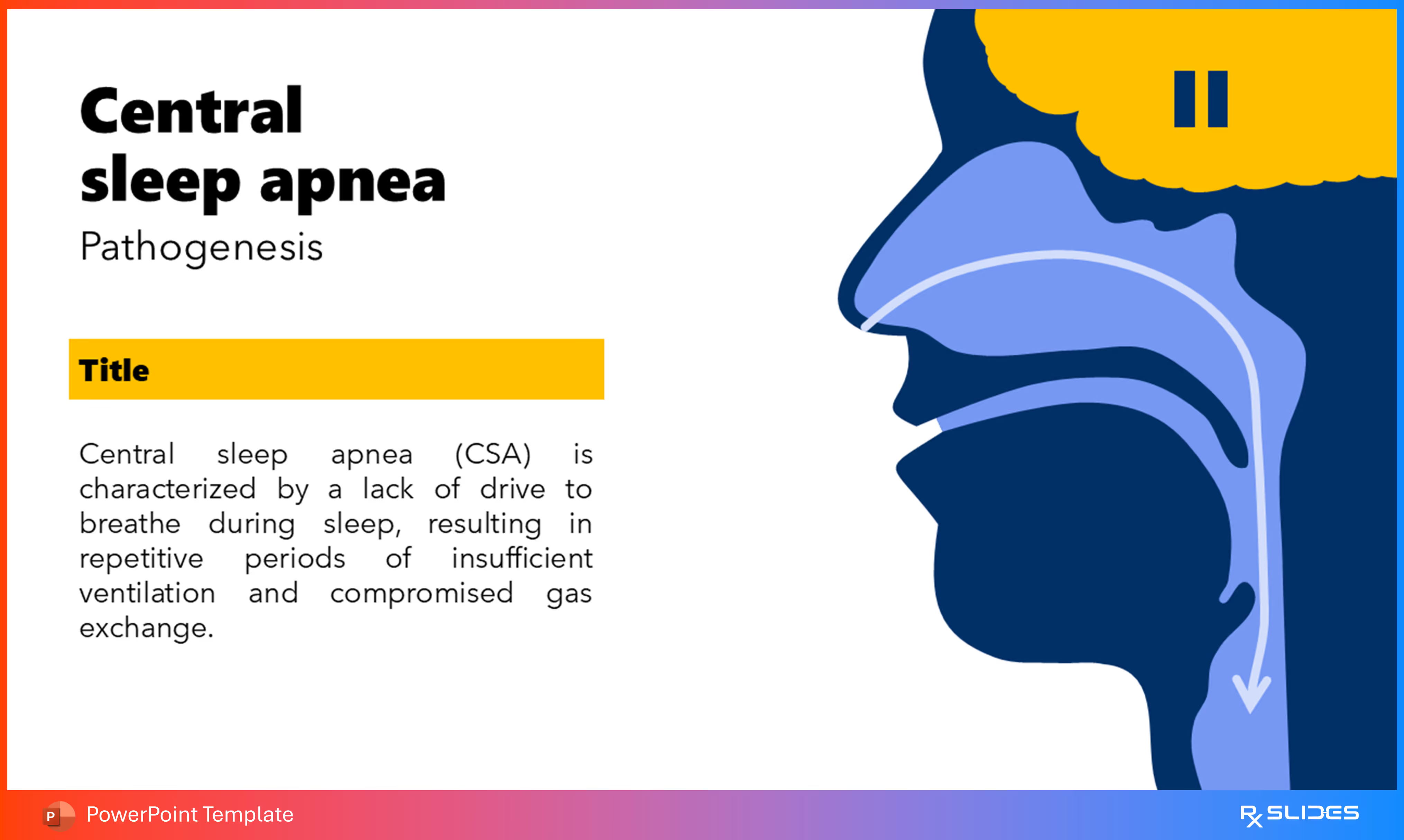
- This slide clarifies how insufficient ventilation and compromised gas exchange occur, offering a clear understanding of the neurological basis.
Slide 24: Sleep Apnea Divider Slide: Animated Slide Template
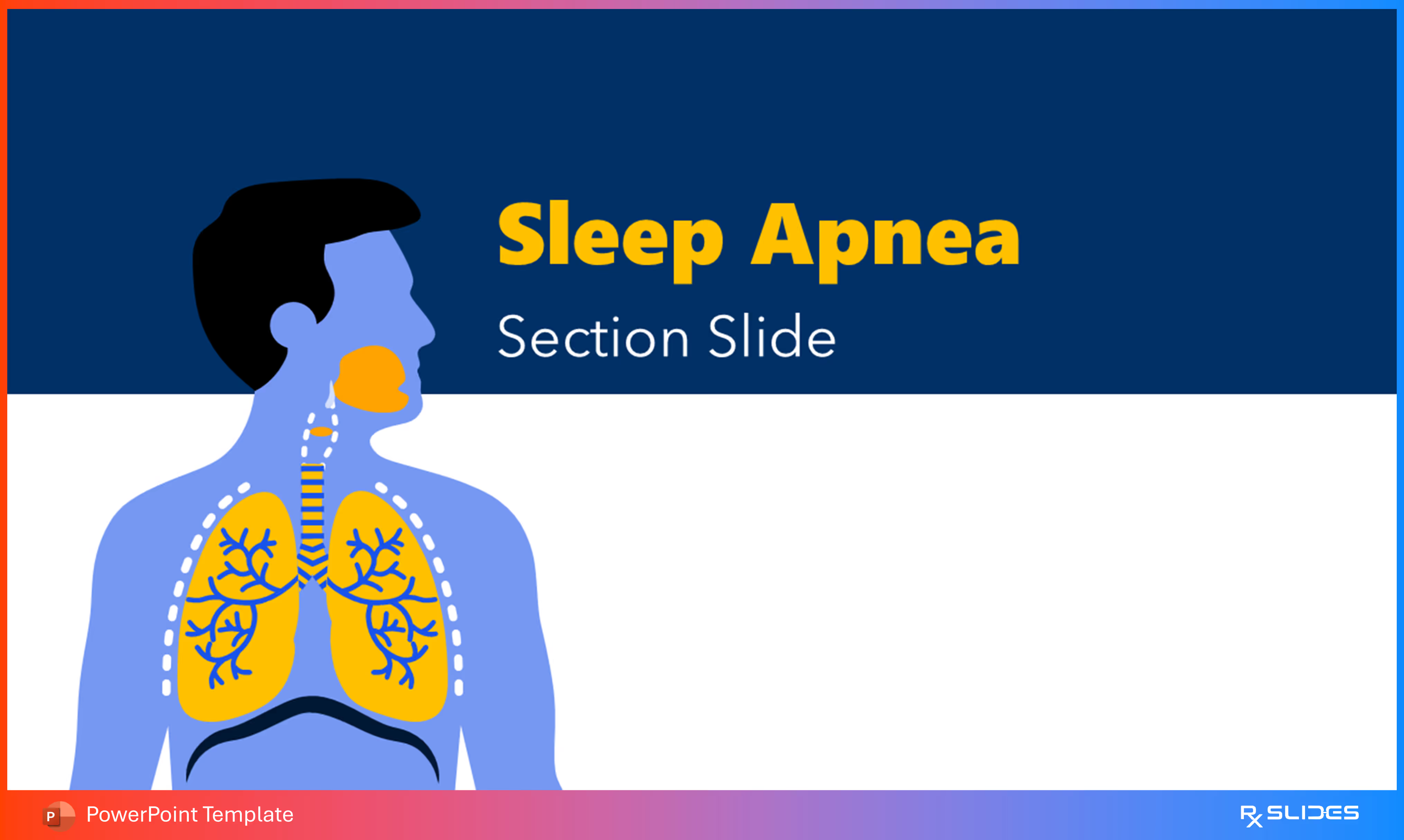
- A slide for smooth transitions. Use this to introduce the "Symptoms" section or any other major topic, maintaining a professional and structured flow throughout your medical presentation on the condition.
Slide 25: Sleep Apnea Symptoms Section Slide
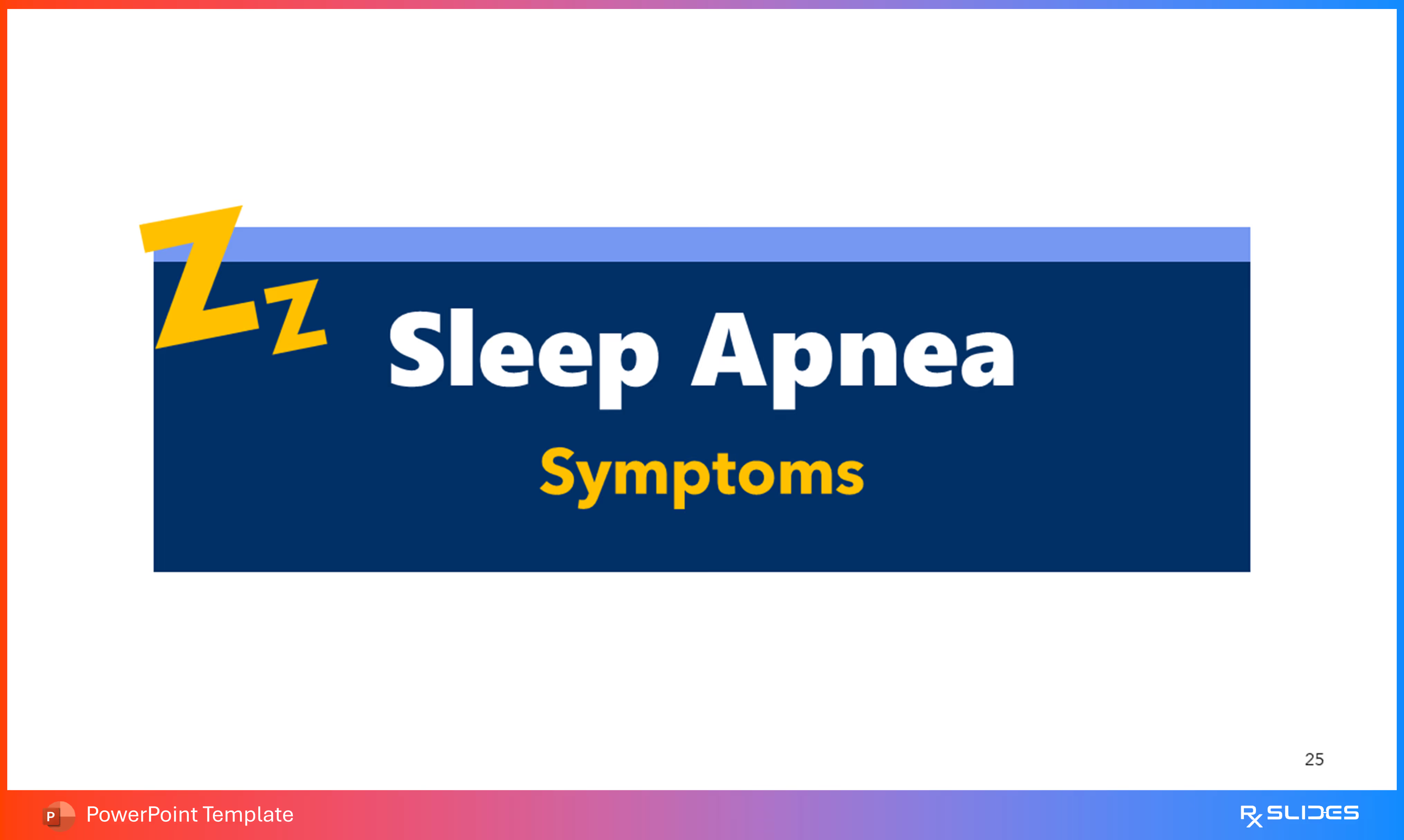
- This section slide introduces the "Symptoms" segment, preparing your audience for a discussion on the various signs and indicators of this disorder.
- A crucial bridge to understanding the clinical manifestations of the condition.
Slide 26: Obstructive Symptoms Animated Slide
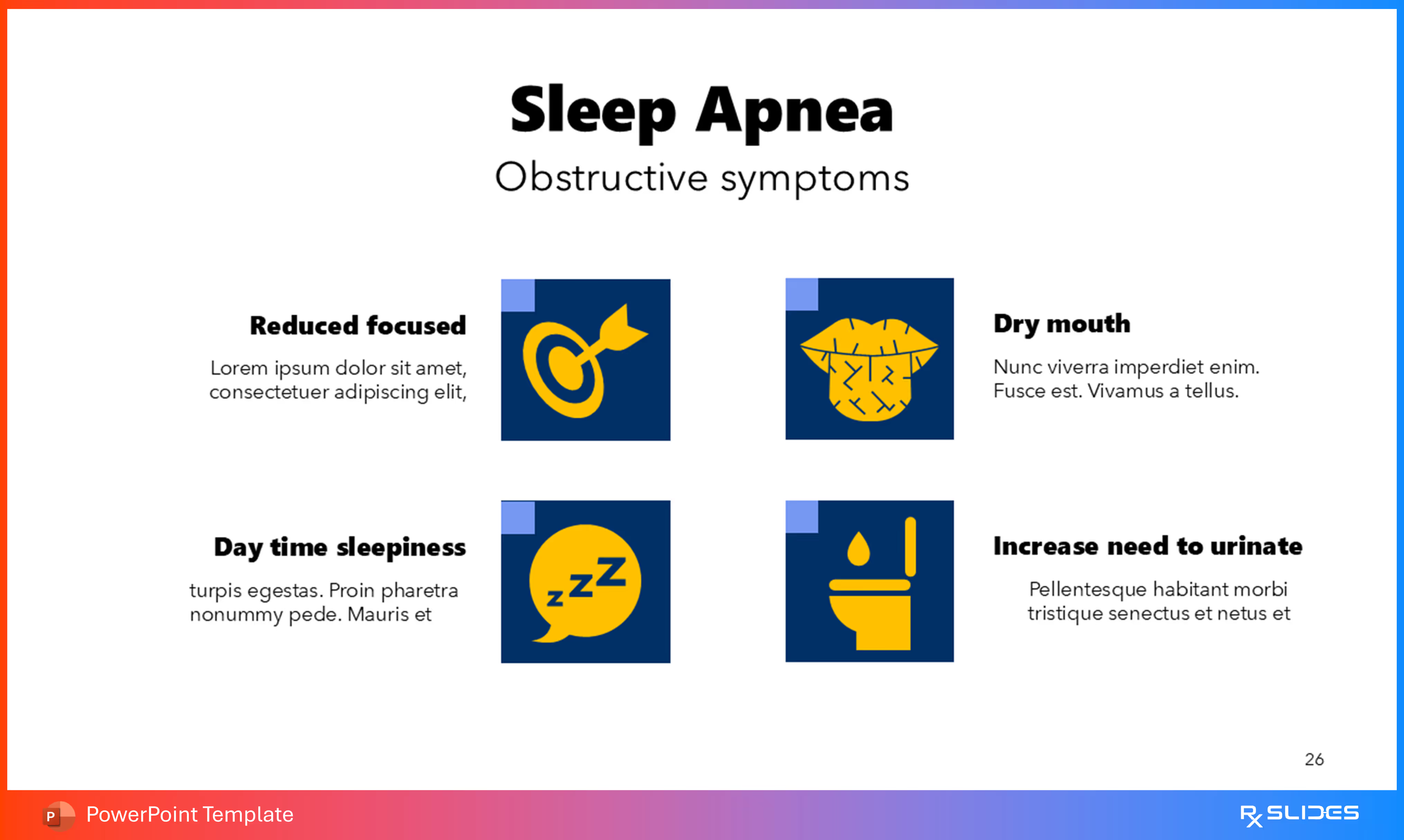
- List and describe the common symptoms associated with obstructive sleep apnea, such as increased need to urinate, daytime sleepiness, dry mouth, and reduced focus.
- You can add or remove any text according to your medical reference. This slide can be used for diagnostic criteria training for respiratory diseases.
Slide 27: Central Symptoms Animated Slide
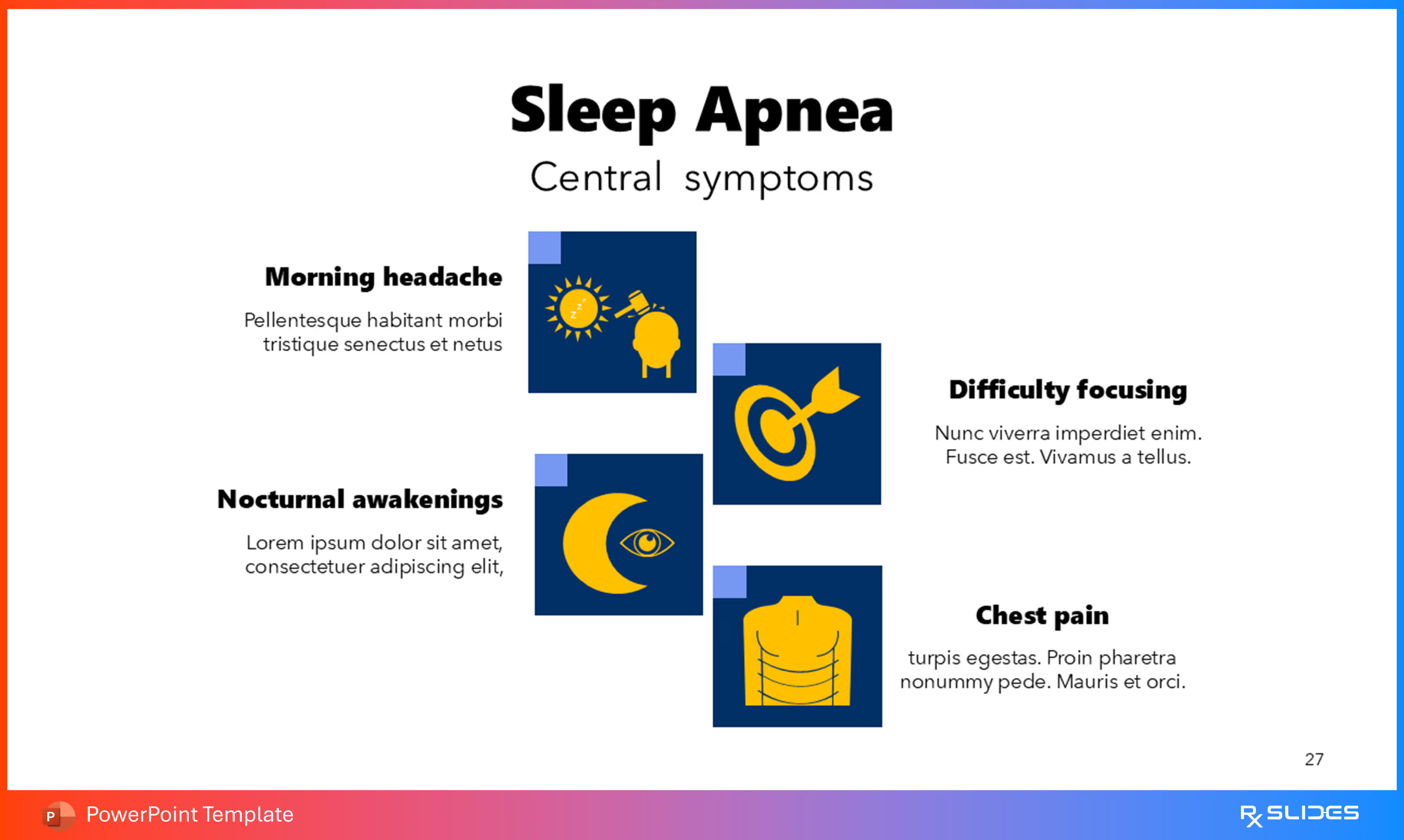
- Highlight the distinct symptoms of central sleep apnea, including nighttime awakenings, chest pain, difficulty focusing, and morning headaches.
- This slide helps differentiate CSA from other sleep disorders and is key for CSA clinical assessment and symptom-based diagnosis of this particular type.
Slide 28: Sleep Apnea Symptoms: General Symptoms Overview
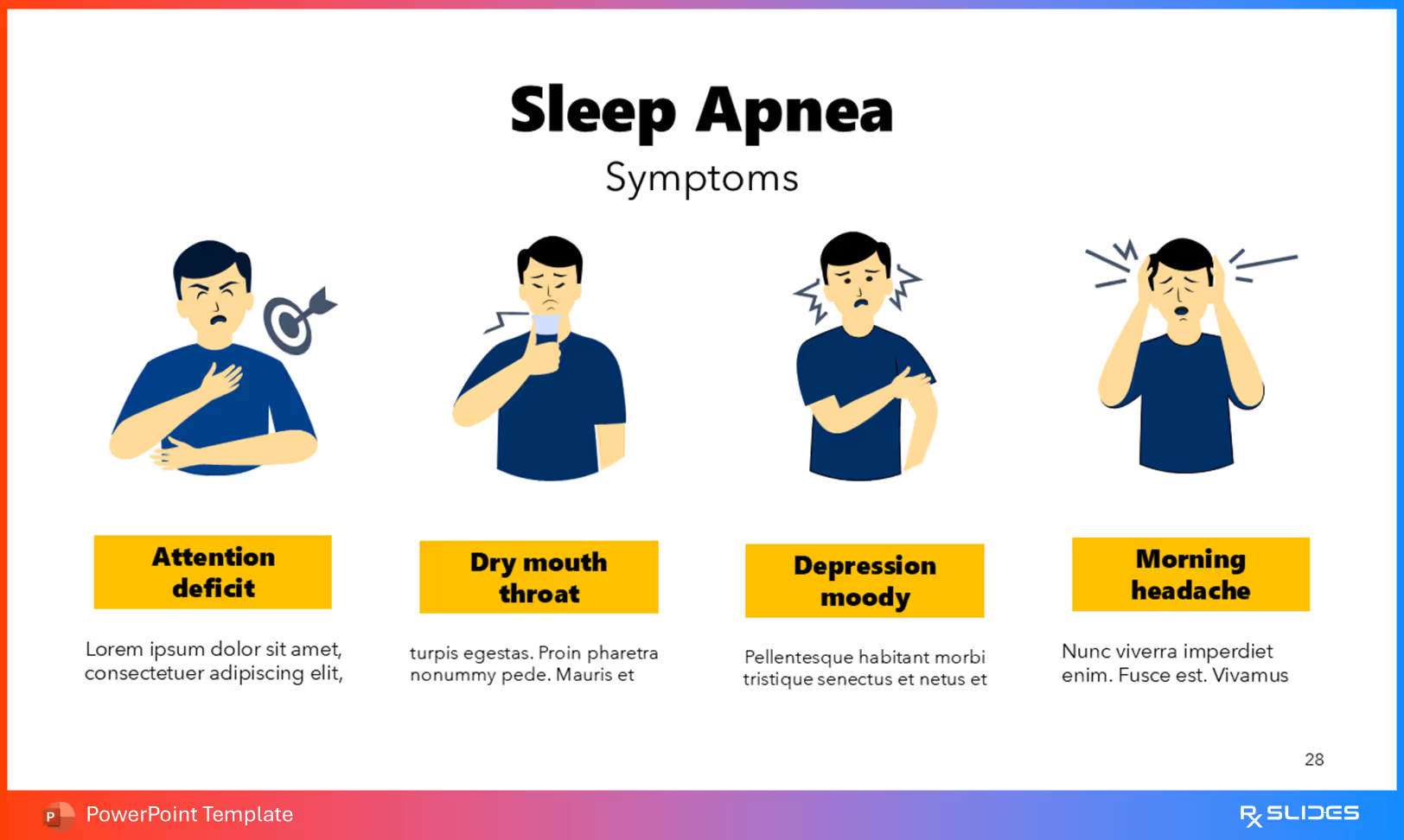
- Provides a broader overview of various symptoms of the condition, including attention deficit, dry mouth/throat, depression/mood changes, and morning headache.
- This comprehensive slide is excellent for the impact of the syndrome on daily life and overall health, aiding in sleep disorder screening and patient education on its symptoms.
Slide 29: Sleep Apnea Section Slide Design
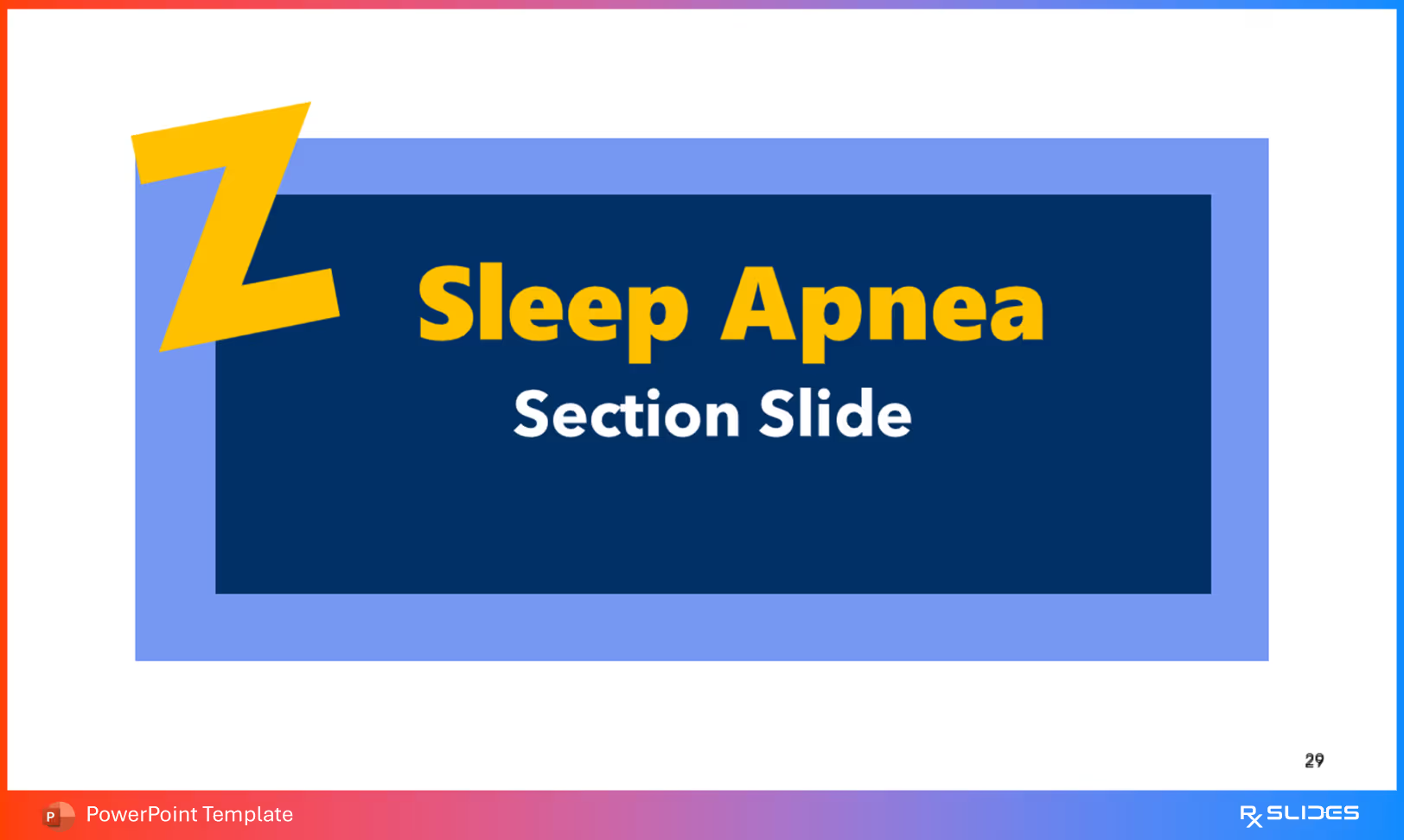
- Customizable section slide to ensure optimal organization and flow within your lecture on the condition.
- Duplicate or modify as needed to suit your presentation's structure.
Slide 30: Sleep Apnea Section Slide Creative Design
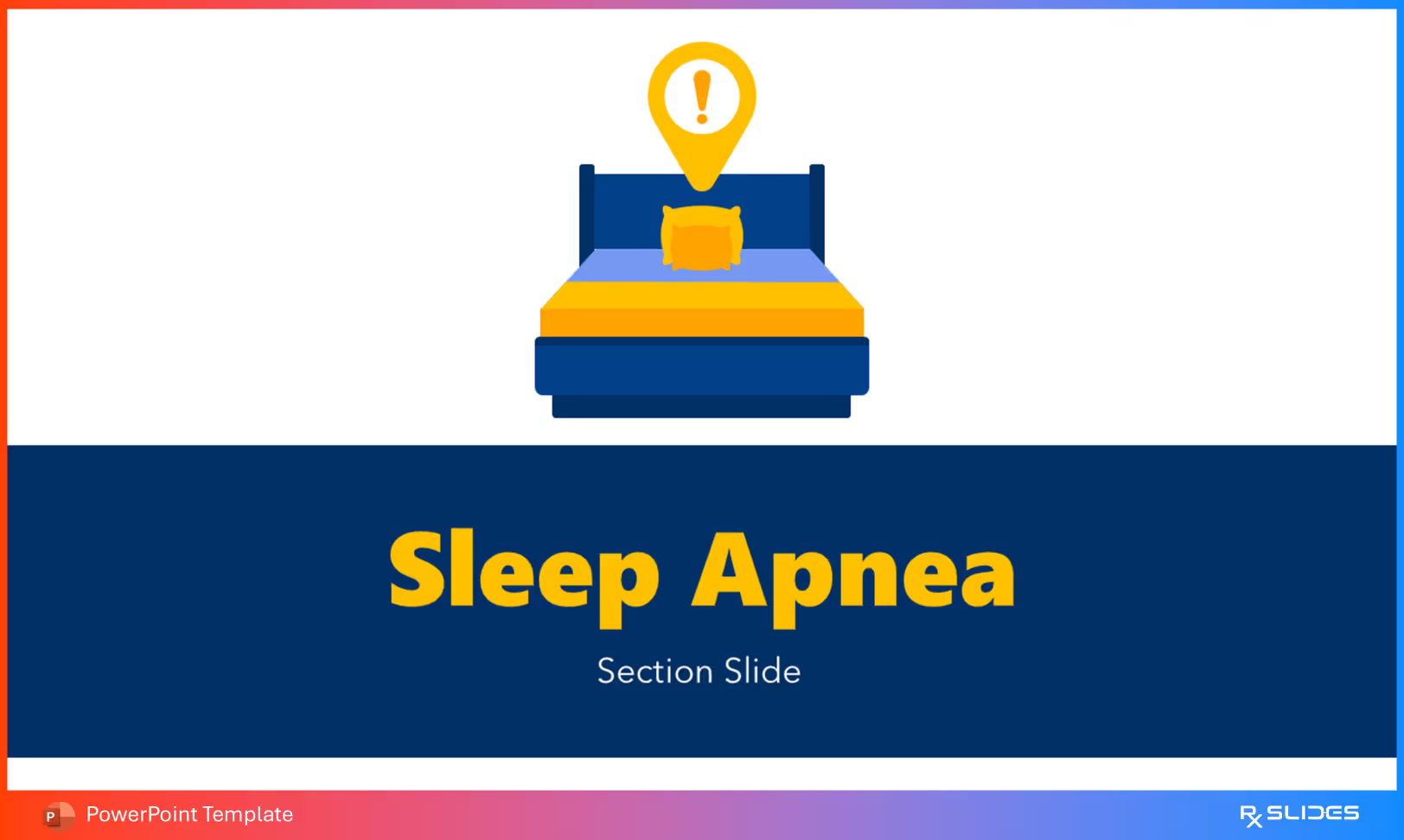
- Another customizable section slide to ensure optimal organization and flow within your lecture on the condition.
- Duplicate or modify as needed to suit your presentation's structure.
Slide 31: Sleep Apnea Diagnosis Slide Template
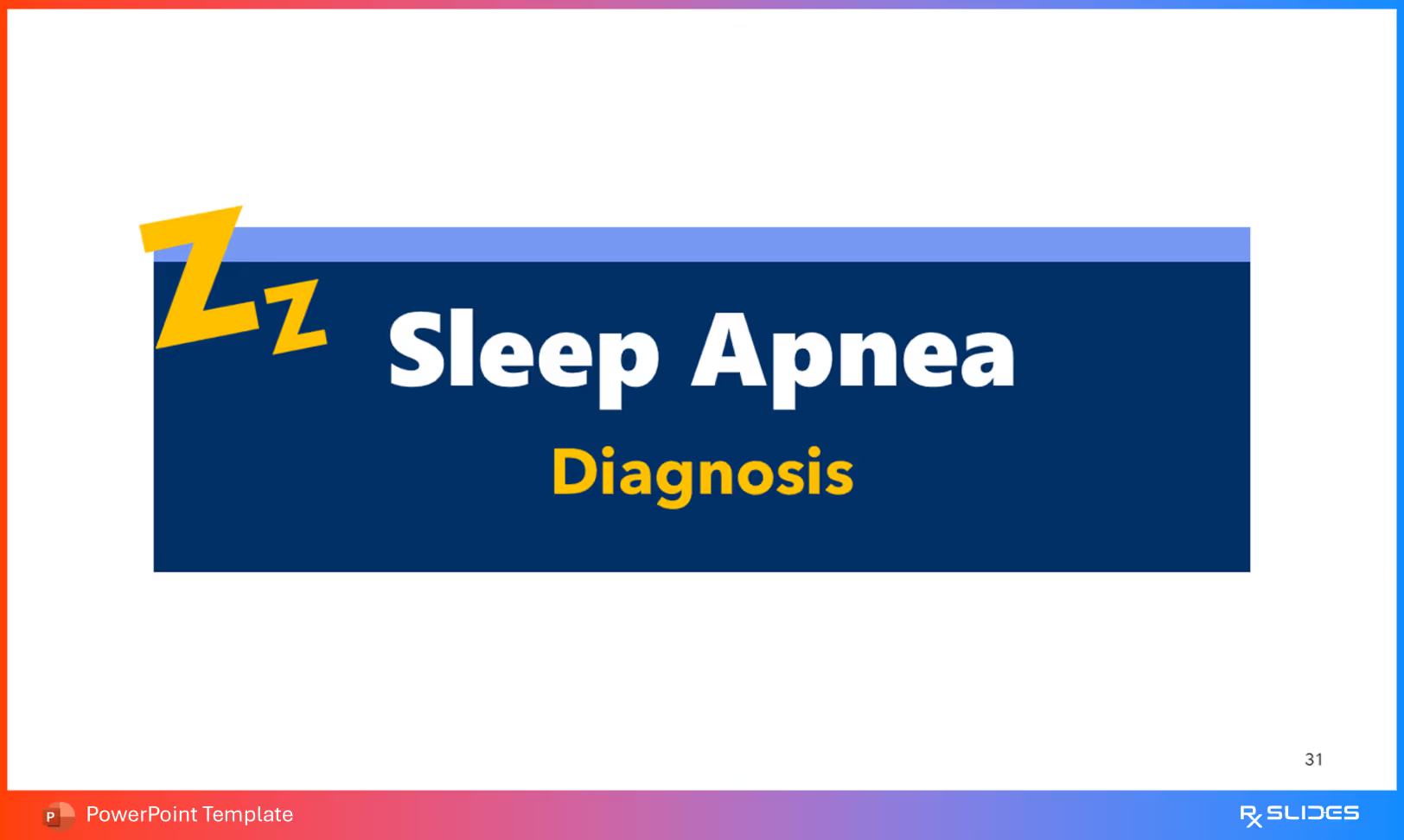
- This section slide introduces the "Diagnosis" segment, setting the stage for a detailed discussion on how the condition is identified and confirmed.
Slide 32: Polysomnography Diagnosis Animated Slide
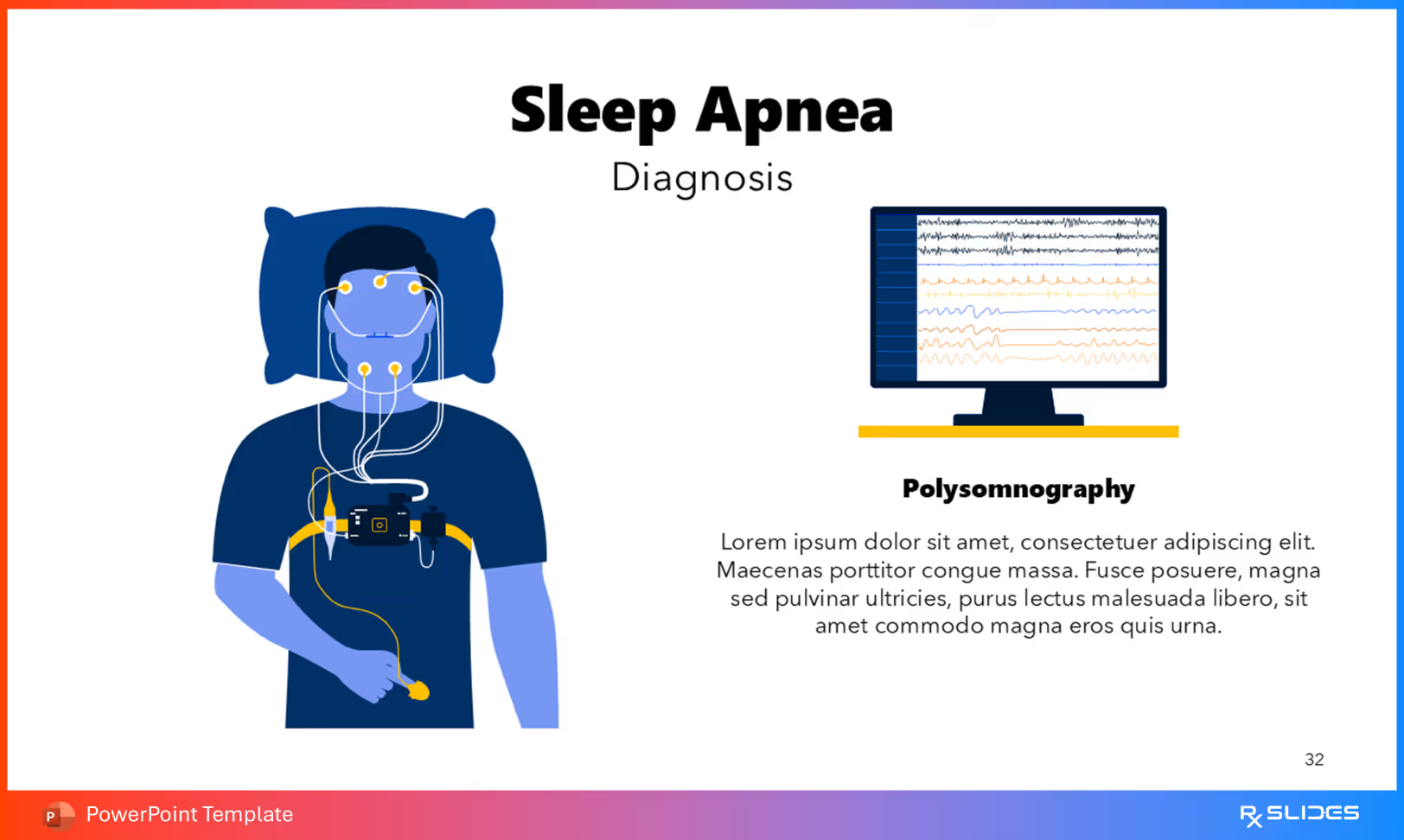
- Focus on "polysomnography" as a primary diagnostic tool for the disorder; just insert your diagnosis text below the animated shape.
- This slide can describe the procedure, what it measures, and its importance in confirming a diagnosis. Critical for sleep study interpretations and diagnostic pathways for the syndrome.
Slide 33: Sleep Apnea Treatment Slide Template
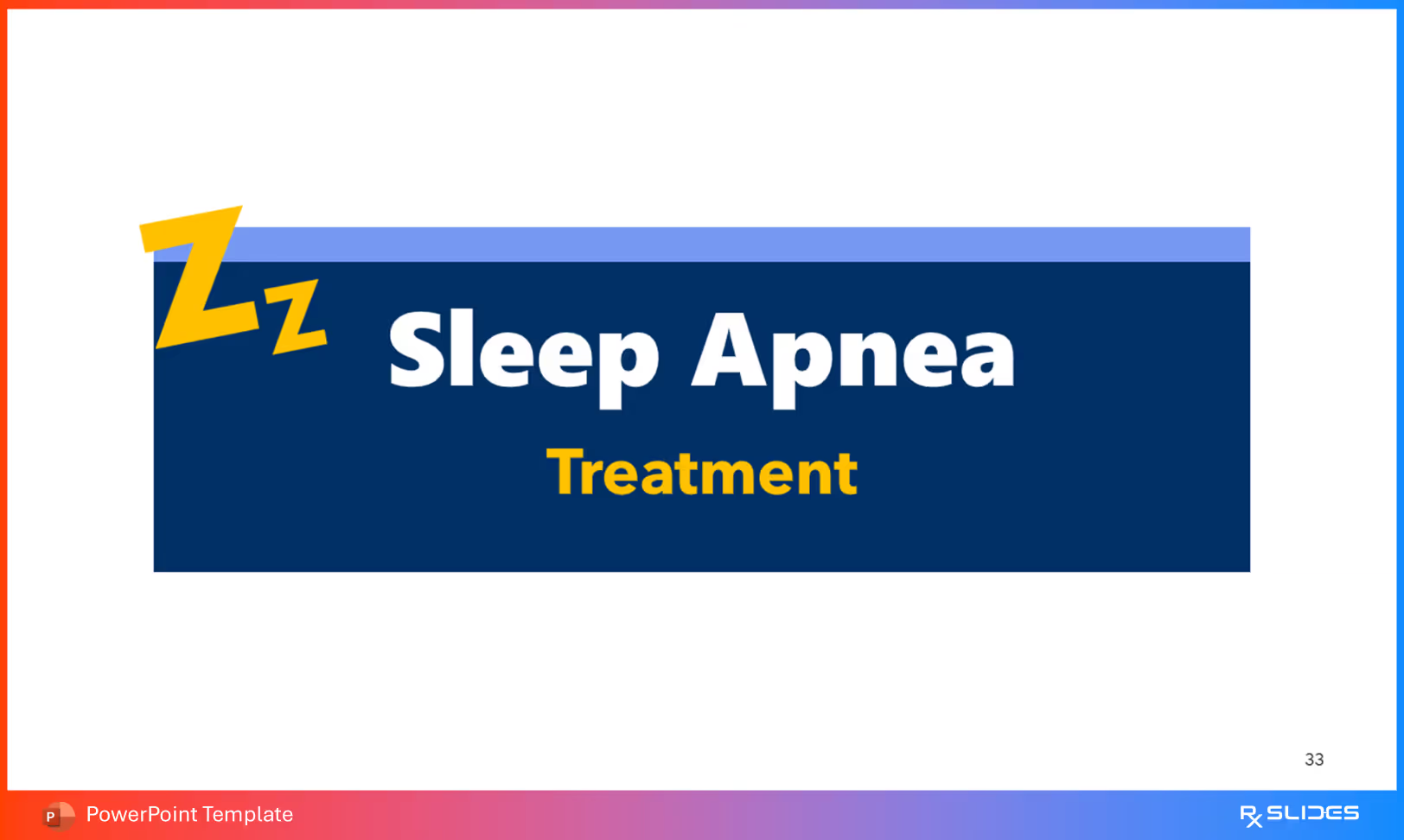
- This section slide introduces the "Treatment" segment, outlining the various approaches and interventions available for managing this condition.
- A crucial bridge to discussing therapeutic strategies for sleep disorder management.
Slide 34: Treatment Overview of Approaches
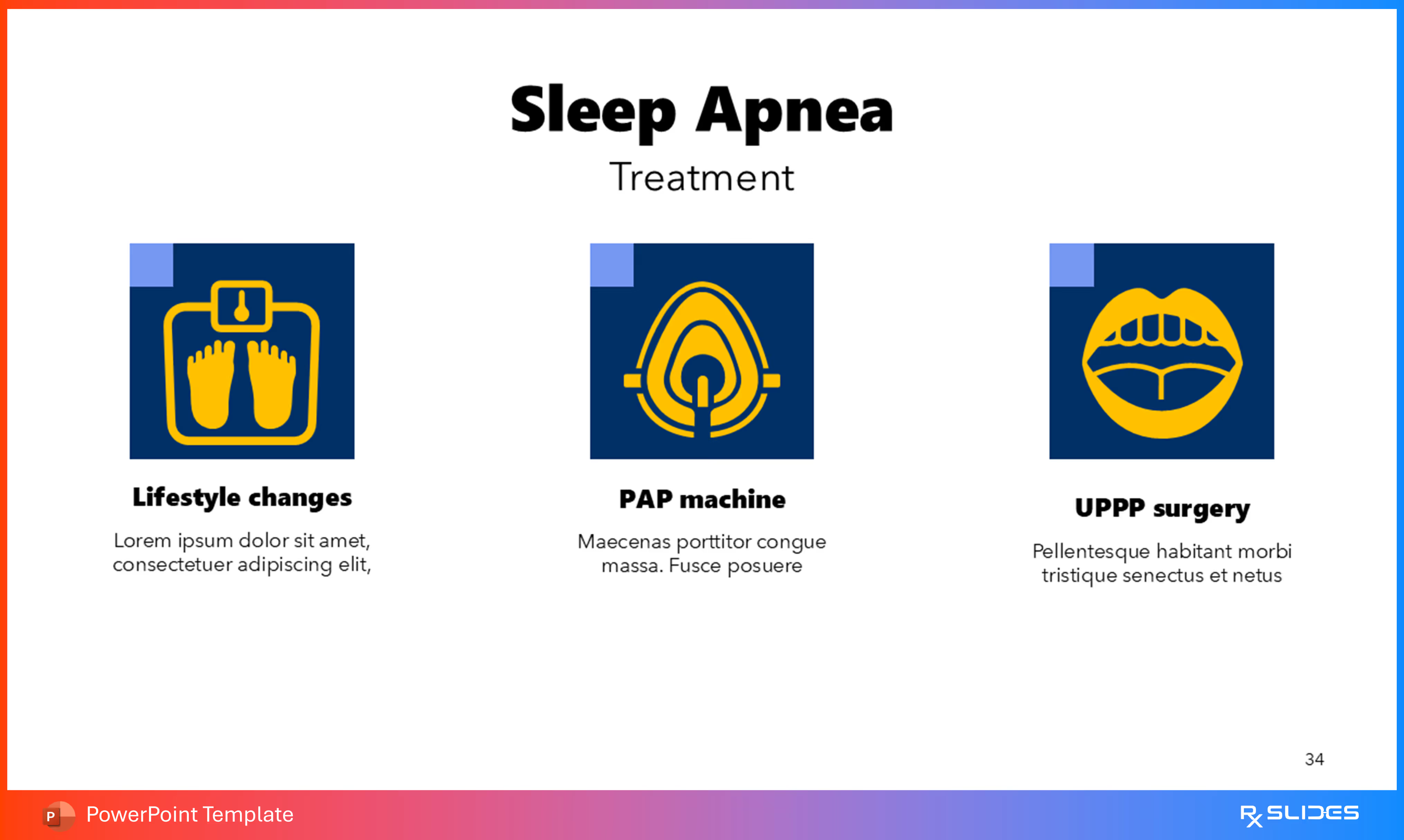
- Provides a high-level overview of key treatments for the syndrome, including lifestyle changes, PAP machines, and UPPP surgery.
- This slide offers a quick snapshot of the therapeutic landscape, ideal for initial patient consultations or introductory lectures on therapy options for this condition.
Slide 35: Treatment: Continuous Positive Airway Pressure (CPAP)
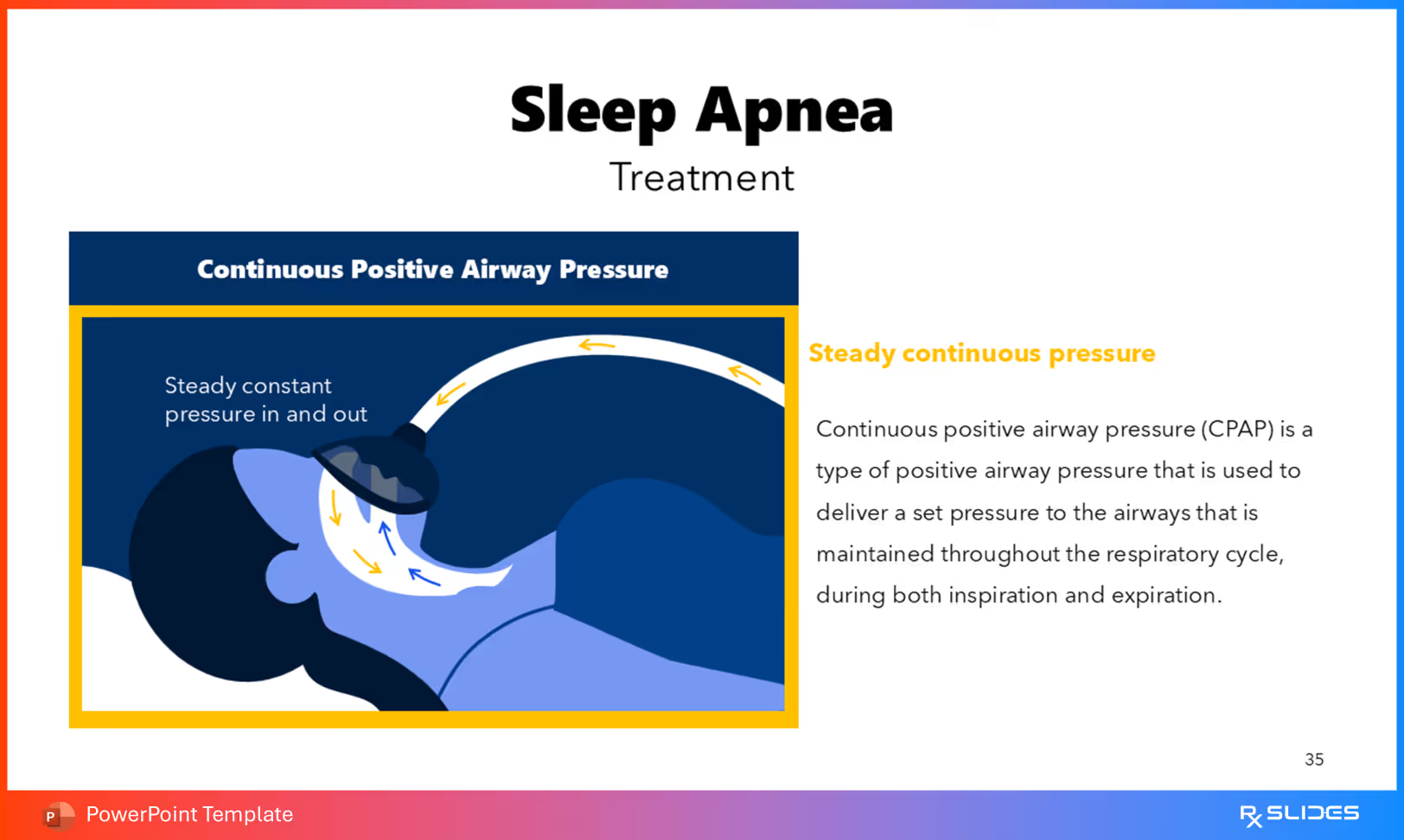
- This slide explains CPAP's mechanism (steady continuous pressure) and its role as a cornerstone of managing this breathing disorder. Use your own text with medical references to make the best use of this animated design.
- Essential for CPAP patient education and sleep therapy training.
Slide 36: Treatment: Automatic Positive Airway Pressure (APAP)
.avif)
- Explain "Automatic Positive Airway Pressure (APAP)" therapy. This slide highlights how APAP machines adjust pressure breath-by-breath in response to airflow changes, offering a more dynamic treatment approach for the condition. Important for APAP device discussions and personalized sleep disorder therapy.
Slide 37: Treatment: BiPAP Therapy
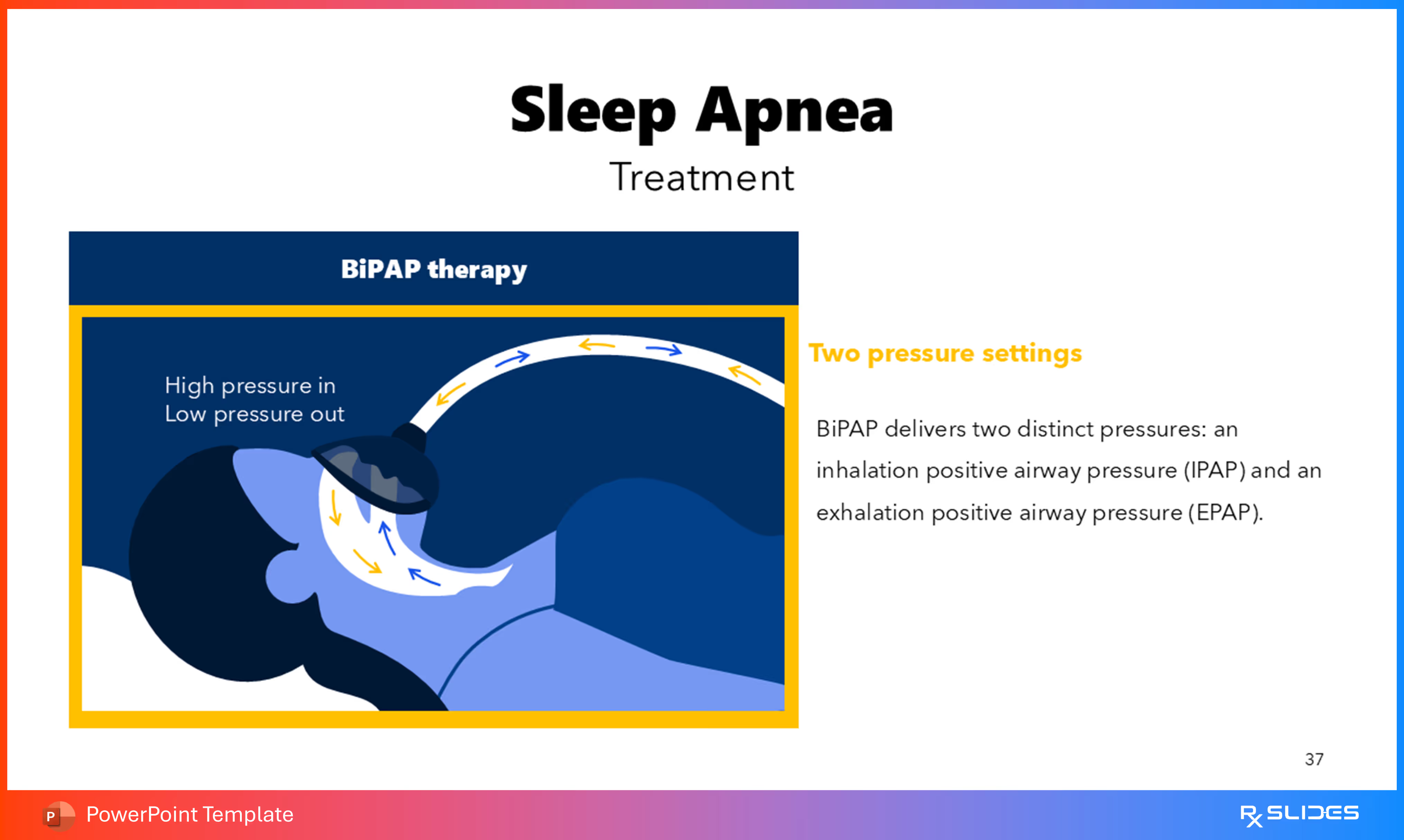
- Describe "BiPAP Therapy," emphasizing its dual-pressure settings (inhale and exhale pressure—IPAP and EPAP). This slide clarifies the nuances of BiPAP, an important consideration for specific patient needs when addressing the disorder. Crucial for BiPAP application understanding and advanced management of this sleep-related condition.
Slide 38: Uvulopalatopharyngoplasty (UPPP) Surgery—Animated Design
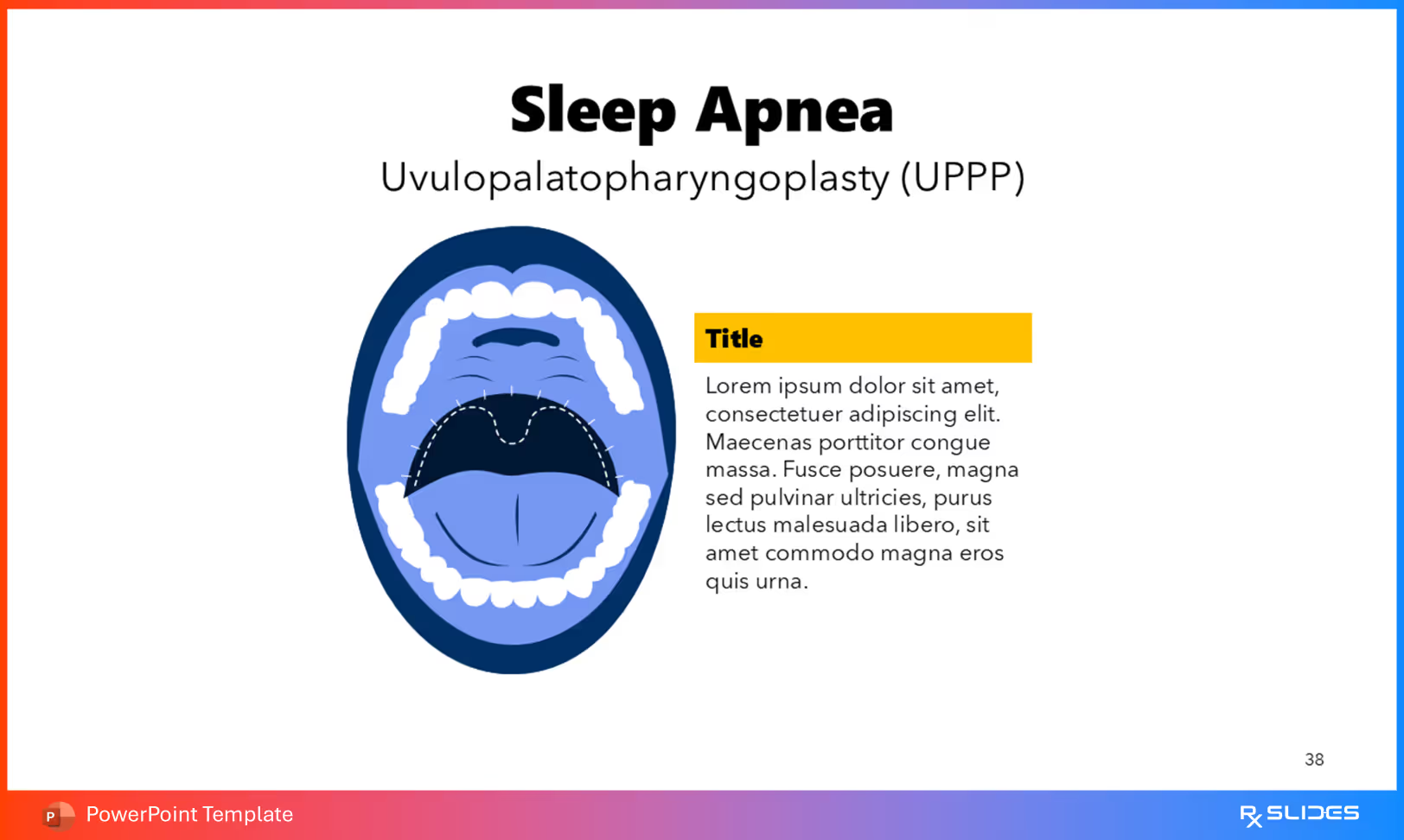
- This slide can explain the procedure and its indications. Relevant for surgical interventions for the condition and multidisciplinary sleep disorder management.
- Just insert your referenced information in this clean design.
Slide 39: Sleep Apnea Prevention
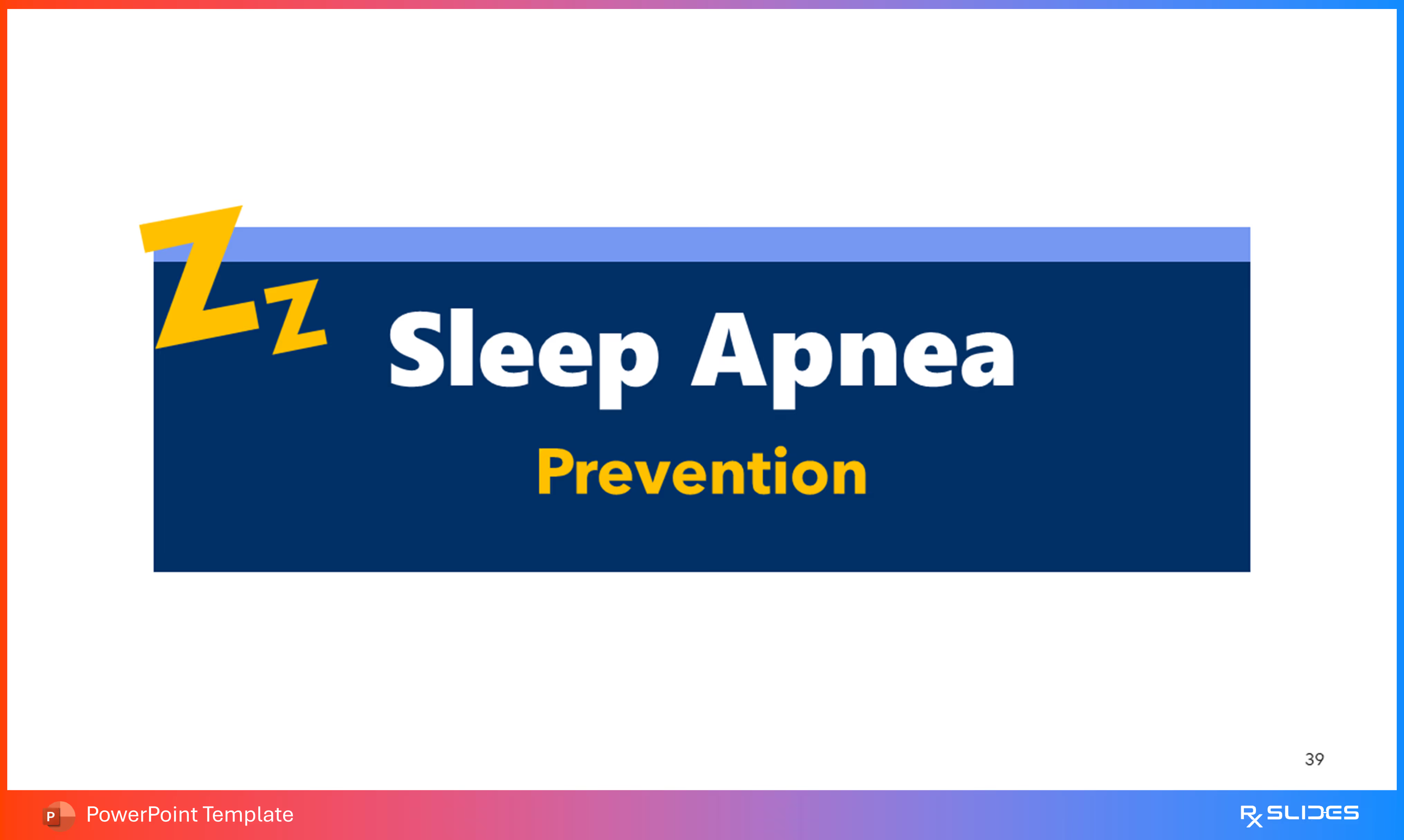
- This section slide introduces the "Prevention" segment, setting the stage for a discussion on strategies and lifestyle modifications to reduce the risk or severity of the disorder. Important for public health initiatives and patient counseling on avoiding this issue.
Slide 40: Prevention Key Strategies for Sleep Apnea

- Outline prevention strategies for the condition, such as avoiding alcohol and smoking, maintaining a healthy weight, and sleeping on your side.
- This slide offers practical, actionable advice, making it highly valuable for patient education on prevention and lifestyle interventions for sleep health.
Slide 41: Sleep Apnea Infographics
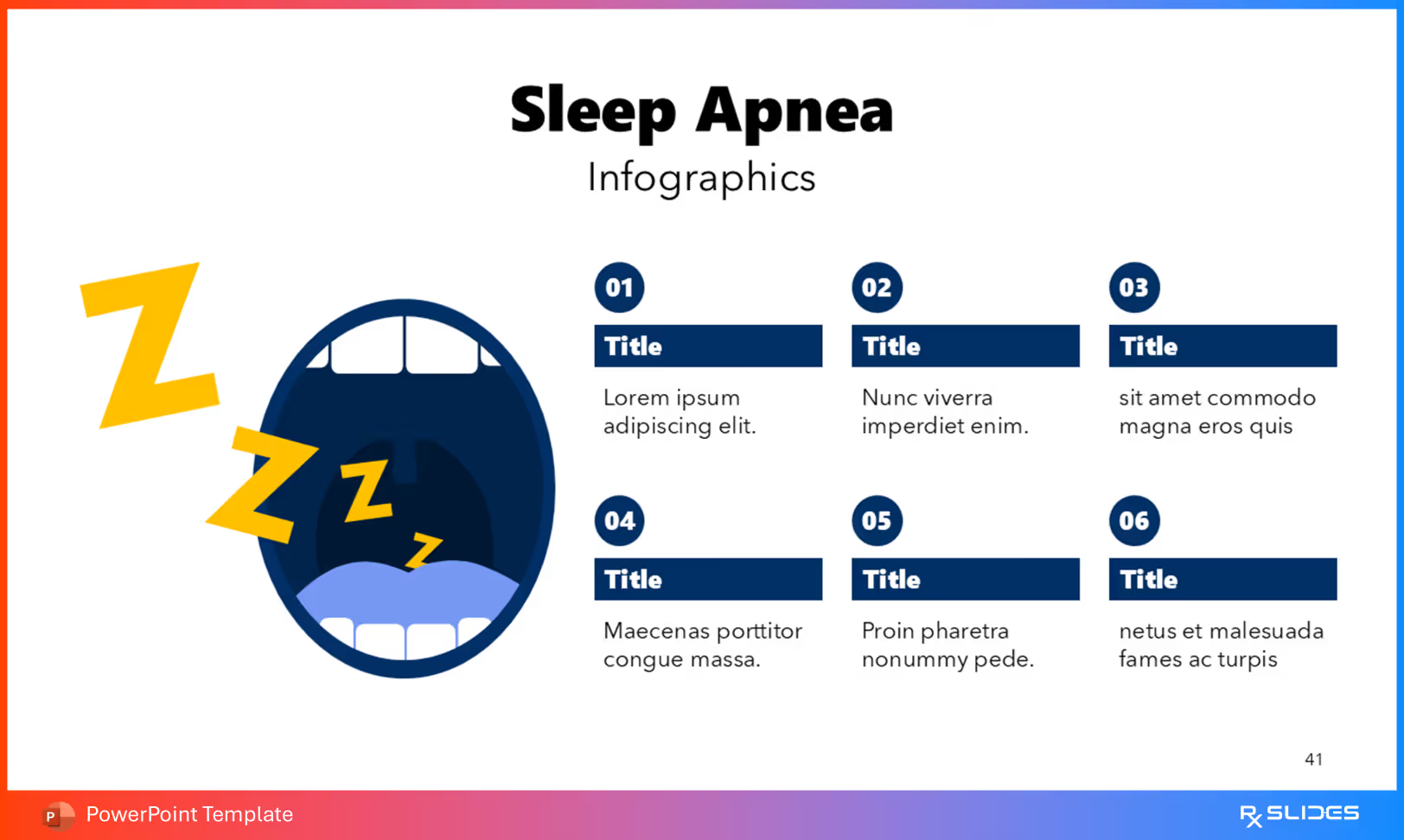
- A slide featuring six customizable title and description placeholders.
- This allows you to visually represent key data, statistics, or steps related to the condition in an engaging and easily digestible format.
Slide 42: Sleep Apnea Section Slide: Lateral Creative Design
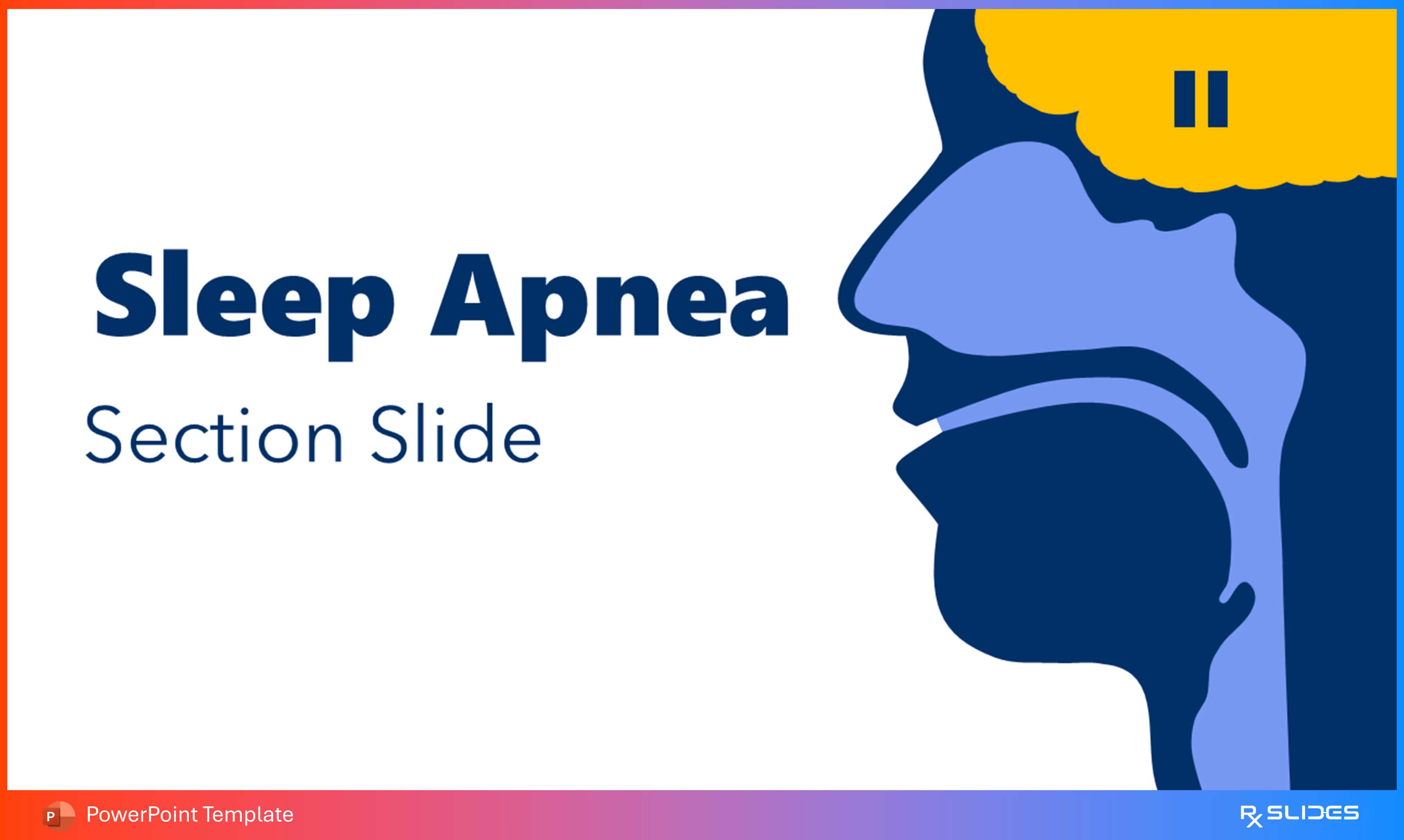
Another flexible section slides for maintaining the structured flow of your medical presentation on the topic. Use it to signal the conclusion or transition to a Q&A session.
Slide 43: Thank You Animated Slide

The concluding "Thank You" slide provides a professional and courteous close to your presentation on this important medical subject. It's an opportunity to reiterate contact information or invite questions, leaving a lasting positive impression.
Features of the Template
- 100% editable PowerPoint template.
- Editable colors, you can change according to your presentation style and company branding guidelines.

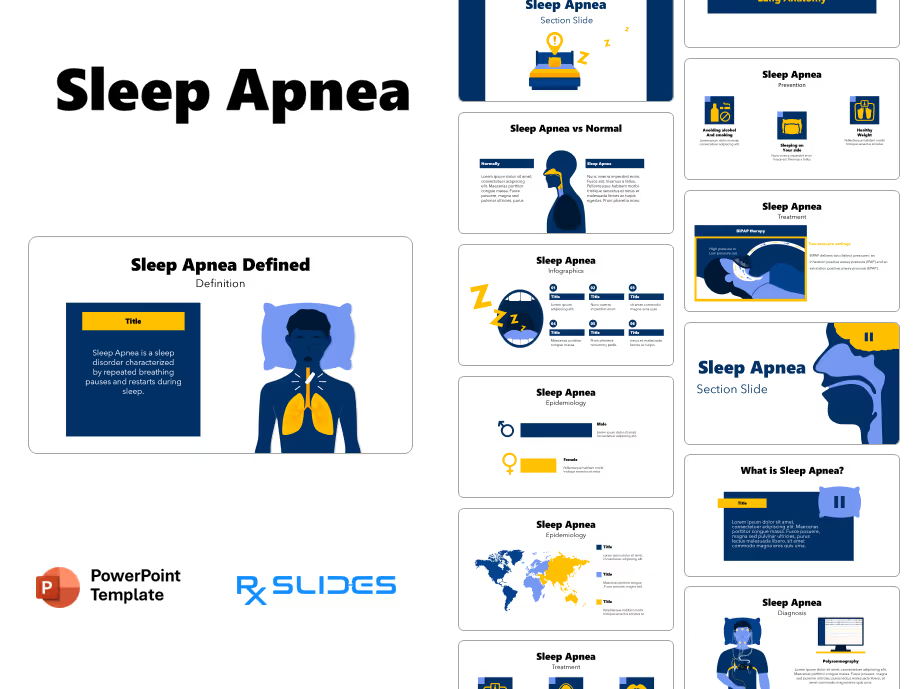
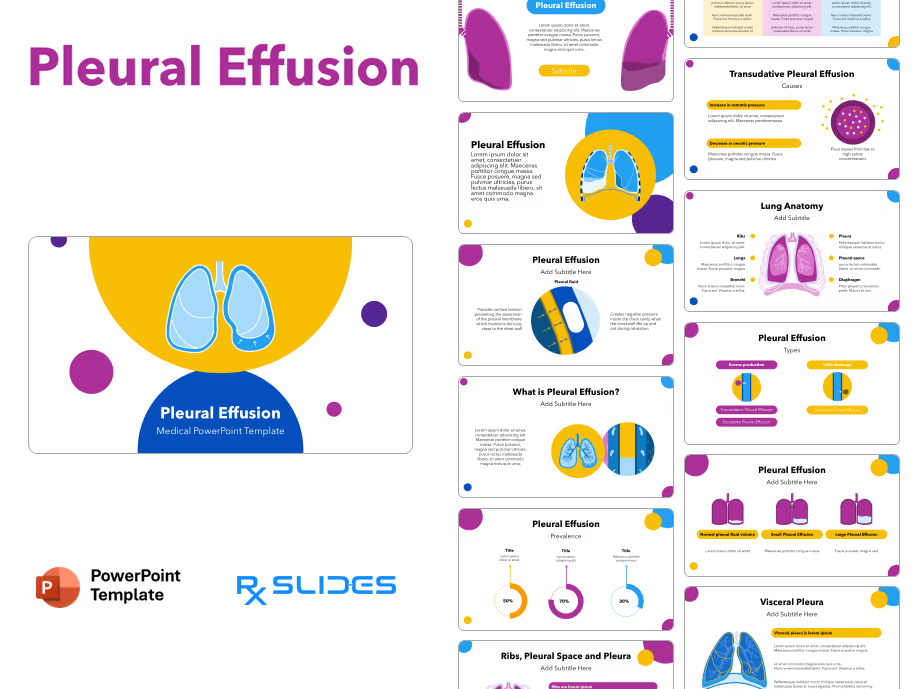


.avif)
